Trump wages economic war on US allies, while BRICS builds alternative system
Donald Trump imposes tariffs and unequal treaties on Europe, Japan, and Korea, forcing them to move factories to the US, while BRICS creates a multipolar world order. Economist Michael Hudson explains
Donald Trump is imposing tariffs and unequal treaties on longtime allies in Europe, Japan, and South Korea, forcing them to pay and move their factories to the US.
Meanwhile, BRICS and the Shanghai Cooperation Organization (SCO) are building a new multipolar world order based on mutually beneficial trade and investment.
Ben Norton is joined by economist Michael Hudson to discuss.
Video
Podcast
Transcript
(Introduction)
BEN NORTON: The US government has always had a very aggressive foreign policy. The United States has intervened in dozens of countries all around the world.
But what is unique about Donald Trump is that many of his aggressive policies not only target US adversaries like China, Russia, Iran, Venezuela, and Cuba, but also longtime US allies.
Trump has imposed high tariffs that have hurt the economies of key US allies such as Japan, South Korea, and Europe.
In fact, the details of the agreement that Trump imposed on Japan are quite shocking. This was reported on by the Financial Times, which wrote that “Japan confronts the increased price of US friendship”.
Although I would say it's not so much “friendship”; rather it's vassalage. Japan has been militarily occupied by the US for 80 years, and we're now seeing the cost of this imperial relationship.
Because as part of the trade deal that Trump imposed on Japan, the US will be putting 15% tariffs on Japanese exports to the US, whereas Japan is not allowed to impose tariffs on US exports to Japan.
Moreover, what's shocking about this deal is that Japan is being forced to invest $550 billion in the US economy, and Japan must do this by January 19, 2029, which is Trump's last day as US president.
But that's not all. In this extremely one-sided, imperial agreement, the US government has complete control over Japan's investment. We’re talking about half a trillion dollars of investment. And as the Financial Times put it:
[The deal] reeks of coercion: a sovereign nation forced to funnel private and public-sector investment to a much richer one under a structure unashamedly directed by the US president.
Once Japan recoups its investment, it then reaps only 10 per cent of the cash flows from the project, to America’s 90 per cent. Yes, Japan has nominal input via a consultative committee into which projects are chosen, but there are no Japanese on the more powerful investment committee and it’s Trump who makes the ultimate call. Yes, Japan can elect not to fund an investment, but if it does so the US may impose new tariffs on Japan “at the rate determined by the President”.
So this is an extremely one-sided deal. The US gets 90% of the return on investment, and Trump personally has control over Japan's $550 billion of investment in the US.
But it's not just Japan. South Korea — another longtime US ally that has been militarily occupied by the US for over 70 years — has also been forced to sign an unequal treaty with the US, in which the US imposes 15% tariffs on Korean exports, and Korea is not allowed to retaliate.
But that's not all. Trump has been humiliating Korea, and the US immigration agency ICE carried out a raid against a major factory in Georgia run by the Korean companies Hyundai and LG, and detained more than 300 South Korean workers in humiliating circumstances, putting handcuffs on them and treating them like criminals.
This has outraged people in South Korea from across the political spectrum, from the left to the right. Media outlets have condemned this abuse of South Korean workers and portrayed their treatment as those of “prisoners of war”, depicting Trump as an aggressive tyrant.
This whole scandal is also deeply hypocritical, because Trump has claimed that he wants to re-industrialize the US, but he is now attacking foreign investors who have been building factories in the US.
The Financial Times reported that the major South Korean companies Hyundai and LG had already invested $20 billion in this factory in Georgia, and they had plans to invest another $20 billion.
This is why a South Korean government official told the Financial Times that the US has put these South Korean companies in an “impossible position”, and the newspaper wrote, “successive US governments pushed them to invest billions of dollars in reviving American industry while refusing to facilitate short-term working visas for projects to be completed on time”.
The FT interviewed the head of research at the Korea International Trade Association, who said, “The US government is two-faced”, because Washington “is asking Korea to invest more in the US, while treating Korean workers like criminals even when it is well aware that they are needed for these projects to happen”.
This is because the US does not have the skilled workers who know how to actually build these high-tech, largely automated factories and create these advanced manufactured goods.
However, instead of training American workers to be technicians and engineers to work in and help to design these factories, the Trump administration is doing the exact opposite.
In March, Trump signed an executive order to abolish the Department of Education, which is currently being run by a billionaire wrestling executive, Linda McMahon, who doesn't even know what artificial intelligence is. (I'm not joking; the US education secretary really doesn't know what AI is.)
So the results of Trump's very aggressive policies is that, one, the US is not re-industrializing; he is not bringing back manufacturing jobs. The contrary is happening.
And two, Trump is alienating longtime US allies like Japan and South Korea, that, again, remain militarily occupied by the US.
And even they are now looking to diversify their foreign relations. They are improving their relations with China, and trading more with China, as their people domestically are outraged by the blatant US attacks on their sovereignty.
In fact, Japan’s Prime Minister Shigeru Ishiba was pressured to resign after signing this humiliating deal with the US, which benefits Washington at the expense of Tokyo.
The same thing has also happened in Europe. Trump imposed another unequal treaty on the so-called US “allies” in Europe, forcing the EU to accept 15% US tariffs on European exports to the US, while Europe cannot retaliate.
Trump also boasted that Europe will be investing hundreds of billions of dollars in the US, and buying weapons from US corporations in the military-industrial complex.
This is how Trump described the trade deal that he imposed on the EU, in a press conference with European Commission President Ursula von der Leyen:
They [the EU] are going to be purchasing hundreds of billions of dollars worth of [US] military equipment.
Very important is that they're going to purchase $750 billion worth of [US] energy. So that's going to be great.
And $600 billion worth of investments into the United States, over and above what they have.
So all of this serves as a reminder of the quote by the late US war criminal and imperial strategist Henry Kissinger, who said, “It may be dangerous to be America's enemy, but to be America's friend is fatal”.
The so-called US “allies” in Europe, Japan, and South Korea are learning this the hard way.
What is also striking is to compare how the US is treating its “allies” with how the countries in BRICS, in the Global South are building alternative institutions and deepening their trade, cooperating together to build a new multipolar world order.
This September, we saw historic breakthroughs in China, when the Shanghai Cooperation Organization (SCO) held a historic summit in the Chinese city of Tianjin, that also featured India's Prime Minister Narendra Modi.
India and China have significantly improved their relations after years of conflict. This comes after the US government tried for decades to divide China and India, to divide BRICS, and to divide the SCO.
But Trump's aggression has actually brought these countries closer together, and accelerated their movement to create a new international financial architecture, one that is not controlled by the US and is not based on the US dollar, but rather uses the national currencies of BRICS countries and SCO members.
So, on one side, you have the allies of the US in Europe, Japan, South Korea, and Australia; the US is imposing unequal treaties on these vassals, which are hurting their economies and benefiting the US at the expense of their own economies.
Meanwhile, the BRICS countries, representing the Global Majority, are building a new financial system that is based on mutually beneficial, win-win cooperation.
The contrast is very stark.
In order to discuss this in further detail, I have the privilege of being joined today by the renowned economist Michael Hudson.
I interviewed him to discuss an article that he published titled “Trump attacks Europe, Korea, Japan, forcing them to subsidize & move industry to US”.
I am now going to play some highlights of our interview, and then I will go straight to the full discussion.
(Highlights)
MICHAEL HUDSON: What Trump and the US is trying to do is a policy of economic coercion, to essentially do to its allies — Europe, the EU, the NATO countries, Japan, Korea, maybe Australia along with that — to say, well, if we're unable to control and dominate the SCO and the BRICS countries, let's consolidate control over our allies.
And if we're going to try to build up America's industrial power, and with it our military power, and our ability to coerce other countries diplomatically, then we've got to draw on the economic power of our allies. And this is an essentially exploitative plan.
…
Trump believes that the US market has been so critical to other countries that they will do anything to subordinate their own interests in the long run, just to maintain access to the US market in the short run.
…
Trump has a standard ploy. He said, well, of course we can roll back the tariffs that would threaten to destabilize your economy; but we want a “giveback”. This is a simple protection racket, is what we call it in the United States.
Trump has said, well, if you follow certain US policies, and if you will agree to transplant your industry to the United States and help us industrialize, take your automobile plants, your industrial manufacturing, your key industries.
…
Yes, Volkswagen, just like Hyundai in Korea, and Nissan [in Japan], all these countries; your companies can continue to make profits, but you’ll make them by offshoring your production from your home country to the United States.
And so he has extracted promises for them to shift to the United States, and promises to roll back tariffs in exchange for their support of US policies.
…
Both Trump and Secretary of State Rubio said, this is not serving us anymore; we can't compete in a fair market. We're not going to be fair, because we don't have to be, because other countries have become so dependent on the American market, that we can punch them in the face, and destabilize their economies, if we want.
They really don't have a choice but to surrender. That was what America believed.
…
And these deals actually serve as an object lesson for saying, well, you have the new international order that is being defined by the SCO and the BRICS meetings — and the alternative, just look at what the United States has done to Europe, Japan, and Korea, that is the alternative.
(Interview)
BEN NORTON: Michael, thanks for joining us today. It's always a pleasure. Now, you published a very interesting article in which you argued that the US has been trying to do to Russia, China, Iran, the BRICS countries, the members of the Shanghai Cooperation Organization (SCO), exactly what the US did previously to its so-called European allies, especially the UK, now the European Union, and increasingly the US is economically attacking its so-called allies in Japan and South Korea.
So the countries most affected by these US policies of economic war — not just Donald Trump's tariffs, but going back even further, the countries most affected have actually been US allies.
And you have explained how the BRICS countries have managed to create an alternative, and they are now accelerating the creation of a parallel financial architecture.
So can you talk about why you wrote this article, how you see what is happening in the world, and what direction you think it is going in?
MICHAEL HUDSON: Well Ben, most of our discussions for the last few episodes that I have been on have been to talk about where is the new international economic order going? Where are the SCO and the BRICS going, under the leadership of China, Russia, now India, Iran, as they create what really was supposed to be created after World War Two, in 1945, a fair trade association of countries under basically the United Nations principle of equality of states; with no special rules for certain countries; with uniform trade rules, uniform investment rules, uniform monetary rules; the whole idea of international trade and investment of mutual gain, where investors and host countries would both benefit, and exporters and importers both benefit.
All of that has been changed radically in the last few years. And that has led to the creation of the SCO, initially in response to America's overt military attacks, to say, if we can't control Russia, China, Iran, and other countries, we're going to press for regime change; we're going to try to overthrow them; we're going to prevent their economic development, by imposing such a high military overhead on these countries that they will become economic failures, just as we used that strategy against Russia in Afghanistan under [Zbigniew] Brzezinski’s idea, to just try to drain countries by warfare.
The idea is to treat all countries that seek independence from the United States to be treated like Russia has been treated with the NATO war in Ukraine, in the Baltics, and on Russia's southern borders.
Other countries are trying to go it alone, and in the process now they have a country, an economy, China, large enough to merge with each other, they found that they don't need trade with the United States anymore.
The election of Trump, and his tariff policy, to use to threaten other countries with chaos, has driven them to create an alternative that will not be based on chaos, but will be based on a more mutual gain, win-win type of situation.
Well, all of the attention has been on how are these countries going to formulate their trade interactions; their means of financing foreign trade in each other’s currencies, instead of having to use the dollar; using the Chinese bank transfer system [CIPS] instead of the SWIFT system that has been weaponized.
As they see — as China, Russia, and Asian countries in general, and the Global South, see the United States weaponizing its foreign trade, its international investment, the dollar system itself, they realize they want to deal with a non-weaponized trade and investment system.
So, all of the attention that you and I, and most of the discussants, have been trying to look forward and forecast is, how is this system going to evolve?
Well, what I want to talk about today is, what about the rest of the world that is not evolving? What about the United States and its allies, who have said, we do not want to be part of this system of non-weaponized trade and investment, because we still want to hope that we can dominate the world, and somehow that we can make the SCO and the BRICS fail, and drive them back into the US orbit.
That is the dream of the American neocons and the neoliberals. And it seems a crazy dream, to go together with their Cold War military attacks — we have seen how that has failed in Ukraine, and has failed throughout much of the world — but it hasn't stopped them.
So I want to talk about what is the alternative to the SCO and the BRICS. What's the alternative to the Global Majority going together to restructure the system of international trade and investment?
Well, you've seen the United States strategists — not only Trump, but he is representing the entire deep state, the entire collective US strategy, the State Department, the national security groups.
BEN NORTON: And Michael, also representing the newly renamed Department of War.
MICHAEL HUDSON: Yeah, he [Trump] has made it very explicit that what we're talking about is not only an economic, commercial, and monetary restructuring; it's really a military alignment.
And Trump has stepped up the intention of promoting regime change and military war, accelerating the war against Russia.
BEN NORTON: And Venezuela
MICHAEL HUDSON: Yeah. Many commentators have already pointed out that NATO has basically failed to confront Russia, but it's still not giving up.
It has failed to mount an attack that has destabilized Russia. What is it going to do as an alternative to military confrontation with Russia, now that Russia and China, and other SCO members, are not only technologically ahead of the United States, not only industrially ahead, but as a result, militarily ahead?
This pretty much leaves the United States militarily with only one option. The only way that it can fight other countries is not by land invasion, not by ships, but by missiles. And missile fighting ends up in atomic war. I don't see the world going that way, until the Americans get even more desperate than they are now.
What Trump and the US policy is trying to do is a policy of economic coercion, to essentially do to its allies — Europe, the EU, the NATO countries, Japan, Korea, maybe Australia along with that — to say, well, if we're unable to control and dominate the SCO and the BRICS countries, let's consolidate control over our allies.
And if we're going to try to build up America's industrial power, and with it our military power, and our ability to coerce other countries diplomatically, then we've got to draw on the economic power of our allies. And, this is an essentially exploitative plan.
In a way, you could say that what Trump is trying to do is recreate for the United States today what Britain did in its sterling area, and its colonialism of the 19th century, to use other countries, subordinate countries, to use its colonies, and its protectorates, and countries that it influenced, including the United States, for its own economy, to sort of subsidize its ability to maintain an imperialistic military threat against these countries.
That's the big picture that the United States is trying to do, and it's trying to do it in ways that, in many ways, are like those used by Britain — a dual set of tariffs, for instance, one set of tariffs for members of the British empire, other tariffs for other countries; a whole division of the world into British and non-British.
Well, what the United States is doing is a similar division of the world into the United States its allies, on the one hand, the 15% of the world — the garden is what NATO calls it.
BEN NORTON: Josep Borrell, the the former EU foreign policy chief, said that.
JOSEP BORRELL: Yes, Europe is a garden. We have built a garden… The rest of the world, most of the rest of the world, is a jungle. And the jungle could invade the garden.
MICHAEL HUDSON: Right, against the rest of the world, that is going ahead.
So the solution by the US deep state is to sort of keep its allies in neocolonial dependency.
Well, how is it going to use their wealth to re-industrialize itself? I think the best place to start is on the economic war with America’s own allies, and exactly what the strategy is, now that Trump realizes that he has lost his ability to do what he dreamed of doing, of just making threats.
The threat that he has imposed on other countries is, well, I'm going to impose these tariffs that are going to cause chaos in your economy, cripple them, lead to unemployment, lead to the bankruptcy of some of your businesses that have depended on the US market.
Trump believes that the US market has been so critical to other countries that they will do anything to subordinate their own interests in the long run, just to maintain access to the US market in the short run.
Well, that hasn't worked. We have seen how it hasn't worked with India. It is unable to influence China and its allied countries.
But it has worked tremendously against America's allies, especially the European allies.
So the Trump group met with the EU head, [Ursula] von der Leyen.
You're seeing the European leadership of individual countries — [Friedrich] Merz in Germany, [Keir] Starmer in Britain, [Emmanuel] Macron in France — you're seeing the result of the US, CIA, and NED (National Endowment for Democracy) interfering in European politics for the last 80 years, really since 1945.
The result of this US interference — with non-governmental organizations (NGOs), with propaganda, with control of the mass media and television — you have nurtured and put in place a group of political leaders whose loyalty is largely to the United States, not to their own countries.
The result is a widening disparity between the political leaders of these countries — the social democrats; the Christian democrats; the so-called “socialist” parties, that are now part of the right wing, not the left wing; all pro-US, liberal parties — and the population at large, that is reacting against the brutal force, and chaos that Trump has tried to impose.
So von der Leyen came to the United States, and the United States, said — Trump has a standard ploy — he said, well, of course we can roll back the tariffs that we threaten to destabilize your economy, but we want a “giveback”. This is a simple protection racket, is what we call it in the United States.
Trump had said, well, if you follow certain US policies, and if you will agree to transplant your industry to the United States and help us industrialize, take your automobile plants, your industrial manufacturing, your key industries.
And now that we have cut off European trade with Russia for its oil and energy, now that Europe is dependent on America’s liquefied natural gas for its energy imports, that have gone way up, Europe itself, its major industrial companies have been faced with falling profits and actual bankruptcy.
What are they going to do?
Trump says, well, there is a way out. Yes, Volkswagen, just like Hyundai in Korea, and Nissan [in Japan], and all these countries, your companies can continue to make profits, but you will make them by offshoring your production from your home country to the United States.
So he has extracted promises for them to shift to the United States, and promises to roll back tariffs in exchange for their support of US policies.
Well, von der Leyen and the three European political leaders whom I have discussed said, well, we’ve made this agreement in order to make Trump happy enough that he will protect us from Russia’s military invasion of Western Europe.
The whole mythology, the parallel universe, that has been created between the European and American sphere’s view of reality and the actual reality, as seen by the Global Majority and the rest of the world, is that somehow Russia and China represent a military threat to Europe, to actually invade it and take it over.
You’re having the leaders of the right-wing parties, namely the ones that call themselves liberal and left-wing parties, all living in this political unreality.
So von der Leyen says, well, it’s worth sacrificing European prosperity as long as America will continue to protect us by fighting Russia and Ukraine, and prevent Russia from taking over Ukraine today, and then Poland next, and then Germany, and then marching right to to the Atlantic Ocean.
Well, that was a crazy thing for von der Leyen to say, because any agreement that you make with Donald Trump is subject to change on a weekly, maybe almost a daily basis. And Trump has continued to keep insisting on new givebacks.
Once he sees that he is dealing with a political party that knuckles under, it's like dealing with a weak adversary in the marketplace in the United States. You just keep pushing and pushing, and you don't know how far you can push until the other side pushes back.
Well, so far, from Europe, there has been no push back at all.
Trump has said, well, we’re not going to spend any of our military budget on fighting Russia anymore; it’s up to you, the Europeans. You must now use your military budget to fight in Ukraine, and to fight in the Baltics, and to fight elsewhere against Russia.
You will do this fighting by buying American military armaments. Well, he didn't add, we know that the arms don’t work; we know that our missiles can be stopped; we know that our anti-missile protection doesn’t work; we know that the back of the tanks can be shot right out; we know that our military arms are obsolete and don’t work, but you have to agree to that anyway.
And Von der Leyen said, well, we’ll agree. She and the Estonian assistant to EU foreign policy.
BEN NORTON: Kaja Kallas, who is now running the EU’s foreign policy. She replaced Josep Borrell, who gave the infamous garden speech.
So they went from someone who was already, you know, a colonialist, to someone who is now even worse, even more of a warmonger.
MICHAEL HUDSON: Yes, they have agreed to all this, and the Europeans have agreed to move their industry to the United States.
And America is pressing them now, well, you’ve got to impose tariffs against India, trade with India, because India is importing oil from Russia to send to you.
We know that we've cut off Nord Stream oil; we've cut off other Russian gas. But you Europeans are still getting oil from India, and it's Russian oil that you're getting.
And you have to punish India for relying on Russia for its own oil, and for refining oil to send to you, with tariffs. You have to cut off your trade with China just like you've cut off your trade with Russia.
You actually have to do, in reverse, what the BRICS and SCO countries are doing. We have to trade among ourselves; we have to isolate European and American trade, and the American dollar sphere, with trade among itself, excluding trade with countries outside of the dollar sphere.
Well, you can imagine the impact of this on European industrialists. And economists say, well, the world is divided into two blocs, and the Global Majority, the SCO, BRICS and Global South, that's where the economic growth, in GDP, in trade, in industrialization and technology, is occurring; it’s not occurring in the United States; it’s not occurring in Europe, either. We're going to lose this market.
And basically, they have been overruled. You’re not having the industrial self-interest determine the actual economic policy of the European governments or other American allies. They're actually willing to put America's economic interests above their own.
And they've been agreeing to move their industries in the United States. So Trump said, all right, we're not going to charge you 25% tariffs; we're going to lower the tariffs on European imports to 15%.
Well, that led the Europeans to think, well, maybe 15% we can live with. Certainly the importers, since we’re the main suppliers of many of these goods to the United States, the American consumers are going to have to bear much of the cost of the tariffs. And we’ll probably lower our prices a bit, and absorb some of the cost of the tariffs, but we can live with that.
But then Trump, this week, has changed the rules once again, all in the small print of the contracts.
This, I think, is such a clever twist that I think most of the world's press has completely overlooked it.
Trump has said, well, when I said you're going to have 15% tariffs, all of this is subject to an existing overriding tariff policy — my very first tariff policy was a 50% tariff on steel and aluminum, in order to help steel and aluminum be made in the United States.
Well, that was pretty much a dream to begin with, because the US steel industry has been dismantled increasingly, from underinvestment and obsolescence.
And aluminum is made basically out of electricity, and there's an electricity shortage in the United States, not only because of the huge new source of demand for electricity for computers [and AI], but the fact that it takes almost a decade for a new electric utility to be put in place to place to increase electricity.
And second, Trump has said that — one way that America has controlled trade for the last half century, to weaponize it, is control of oil. One of our hopes to lock in other countries to US trade control is control of the oil trade.
So we're going to spur the oil trade. And he [Trump] has stopped all alternative sources of energy, in the United States, to oil. He has withdrawn support for the windmills that use air power. He has blocked solar energy, because the solar energy technology is largely from Chinese manufacturers.
He has limited America's energy supply to oil, coal, and gas; not like the rest of the world, which is trying to decarbonize.
Trump has thrown his entire diplomatic support, in foreign policy, to opposing efforts to stop global warming. Carbonization, oil, coal and gas are supposed to be the fuels of the future, not sunlight, wind, and other alternatives to oil.
So, Trump has basically insisted on aluminum and steel tariffs going up to 50%. And he has then blocked European imports of not only automobiles, but also machinery, and goods — any European industrial product that is made out of steel and aluminum is subject to this 50% tariff, not the 15% that he promised, but he is going to calculate, in a very complicated mathematical calculation, how much of this contains steel and aluminum.
Well, this is absolutely crazy, and bureaucratic. It has already led European producers to say, well, most of almost everything we make as an industrial export contains steel and aluminum.
You have had major German makers, of harvesting equipment for instance, say, well, we're going to have to lay off our employees, because our major market, about 20% of the European agricultural machinery is sent to the United States.
That includes the American affiliate of John Deere, an American company that makes harvesting machinery and other agricultural machinery in Germany, and exports it to the United States. It is also impaired, and said, well, we're going to have to lower production; we're going to have to layoff labor. It has become basically a disaster for them. And Trump is refusing so far to give it in on this.
The European agreement with the United States still hasn't been formalized to the very final stage, which is the parliament has to agree on this. And now, for the first time this week, there has been a fight back in the European Parliament, saying, Trump is doing to us what he has done to every other country, bait and switch.
This agreement that we are now being asked to sign is not the seeming compromise — that was no compromise at all — that we thought was being offered by the United States. It’s a policy that results in our dismantling.
Well, the question is, how will the European Parliament vote on this? Well, the problem here is a political crisis for Europe. The existing parliament, the existing political parties, are all Atlanticist, and pro US.
As the Europeans become aware of the complete surrender of European economic autonomy by von der Leyen, in her so-called negotiation, Bambi meets Goliath, with Trump, this means curtains for European industry.
The result is nationalistic parties emerging in Europe. The Alternative for Deutschland in Germany, which Germany is talking about banning from power, and similar right-wing nationalist parties in other countries. This is the political crisis that you’re going to see unfolding.
And for the first time, a Central European argument, politically, across the whole continent, is what bloc are we going to associate our economic and political future with, and our military future?
Will it be the United States Cold War bloc, in which case we have to promise to subsidize Ukraine and any and all US Cold War spending, to counter Russia and other countries that the United States opposes?
Or are we going to realize that our future lies with the Gobal Majority, of countries in the rest of the world. That is what is transforming Europe.
BEN NORTON: By the way, Michael, the director of trade for the EU Commission, who is a German politician named Sabine Weyand, did an interview with the German media. It did not really get any attention in English, because it wasn’t translated by the mainstream corporate media.
But there are some very revealing quotes in this interview from the person who oversaw these so-called negotiations.
She admitted that there were no real negotiations. She said, “If you didn't hear me say the word 'negotiation' – that's because there wasn't one”.
So, in other words, the US imposed its terms on Europe, and they simply accepted it.
And why is that? This top EU official admitted in the interview, “we are completely dependent on the United States”.
Those were the words of a top EU official. So when they're speaking in their native languages, not when they're speaking in English for the US media, but when they're speaking for the German media, they acknowledge some of these inconvenient truths.
But then, of course, they're not second-guessing their extreme Atlanticism.
MICHAEL HUDSON: That's exactly what I was trying to say. And, you're right, there was no real negotiation, because you have von der Leyen and the so-called negotiators acting on behalf of the United States. It’s like a kangaroo court.
BEN NORTON: Did you see, in the press conference, when Trump and von der Leyen first announced the so-called deal, a US journalist asked von der Leyen, what is the US giving up? Does the US give up anything in this deal?
Von der Leyen’s response was, well, we had a trade surplus and the US had a trade deficit, so we're trying to make the trade more equal, as she put it, which is her way of admitting that there was no US concession.
REPORTER: I have a question for the EU Commission president. What are the US concessions? What is the US giving up in the deal, if anything?
URSULA VON DER LEYEN: So the starting point was an imbalance, a surplus on our side and a deficit on the US side. And we wanted to rebalance the trade relation, and we wanted to do it in a way that trade goes on between the two of us across the Atlantic, because the two biggest economies should have a good trade flow between us.
And I think we hit exactly the point we wanted to find. Rebalance, but enable trade on both sides, which means good jobs on both sides of the Atlantic, means prosperity on both sides of the Atlantic. And that was important for us.
DONALD TRUMP: And again, the energy is a very important component, because we have more energy than anybody else, in that sense.
I think it is very wise that they buy a lot of [US] energy, and it's great stuff. And it solves a lot of problems. So that was a great decision, I think.
MICHAEL HUDSON: Well, also, the US gets an enormous amount of international payments [from the EU], on debt service, on remission of profits by American companies abroad. America makes on its capital account an enormous amount of money.
Plus, Europe's international monetary reserves are sent to the United States to invest in Treasury bonds.
So, von der Leyen knew that she was lying. Her job is to do just exactly that, and to distract attention from what are the actual balance of payments flows between Europe and the United States, for monetary reserves invested in US Treasury bills, remission of US profits and other capital account and military transfers to the United States.
It’s a fictitious world.
BEN NORTON: By the way, Michael, on the subject of European politicians being overwhelmingly Atlanticists, I was recently going through data that was published by the Federal Reserve, and it looked at foreign holdings of US securities, and in particular of US stocks.
And what this data shows is that, of all of the regions of the world, Europe has by far the largest holders of US equities (stocks), and also corporate debt.
Keep in mind that Europe's population is only around 750 million, compared to Asia’s population, which is nearly 5 billion.
Yet, in Europe, they hold over twice as many US stocks and corporate bonds than in Asia.
So obviously, in Europe, the vast majority of elites have a huge part of their portfolio held in US assets, especially stocks and corporate bonds.
So not only are they Atlanticists for political reasons and ideological reasons, but a lot of them, I think, are Atlanticists because it serves their own portfolios. I mean, they're acting in their own economic interests.
MICHAEL HUDSON: I don't think they are. Trump's announced policy is he wants to lower the dollar’s exchange rate.
Now, if he lowers the dollar's exchange rate, that means that the value of US bonds, and US stocks, and US Treasury holdings, as denominated in euro, is going to go down. So they'll take a foreign exchange loss on whatever interest rates, and capital gains, and stock dividends they get.
So what seems to be in their short-term interest is going to go kaboom if they live in the long run.
The Europeans live in the short run. The short run determines, you know, when is the next election.
The Asians are looking at the long run. The Asians are avoiding, are moving out of letting their money stay in the US, because you've seen America grab $300 billion worth of Russian investments in the West.
The Asians say, we don't want the US to do with us what it has done to Russia. Of course they're moving out. They're afraid to hold US investments.
Of course, what the United States has grabbed from Russia, it can grab from Saudi Arabia, or Turkey, or any other country that wavers in its loyalty and submission to US foreign policy.
BEN NORTON: If you look at the official data from the Federal Reserve on foreign holders, official holders — that is, foreign central banks investing in US Treasury securities — you can see that, in recent years, the BRICS countries have been slowly, gradually, on net, selling their Treasury holdings.
They're not just dumping them immediately, but, over the years, you can see a chart, and their holdings have been falling, especially China's holdings.
And meanwhile, what are the countries whose central banks have been buying more and more Treasuries? It's European countries, the UK and EU member states.
So Europe is helping to fund the US government, while BRICS countries are on net selling their US government debt.
MICHAEL HUDSON: Well, that's exactly what happened in the 19th century, through World War Two, when India's vast increase in its trade surplus was all kept in London. India was one of the major bolsters of the British sterling area, and the exchange rate.
That was what the United States tried to dissolve and end, successfully, in 1944 and 45, with the British loan (the Anglo-American loan), saying, you have to open your markets; no blocked currency; India and other countries that had built up their foreign exchange during World War Two, they can spend the sterling, and francs, and other foreign currencies wherever they want, meaning in the United States, which was at that time the leading industrial power.
Well, that was America saying, the world economy should be “open”, meaning trade with the United States.
And the result was that the United States increased its holding of gold, between 1945 and 1950, to 80% of the world's monetary gold, as gold flowed out of Europe, and other countries, just as it had flowed during the 1930s, in capital flight, to the United States.
Well, that was when the United States promised an open world economy with equal rights for all, similar to how the United Nations was treating countries.
That's what, both Trump and Secretary of State Rubio says, this is not serving us anymore; we can't compete in a fair market. We're not going to be fair, because we don't have to, because other countries have become so dependent on the American market that we can punch them in the face and destabilize their economies, if we want.
They really don't have a choice but to surrender. That was what America believed, that it was so necessary for other countries, that they had no alternative.
Well, now we're seeing, if they really have no alternative, what is the United States going to do to press its advantage?
And I want to talk about what it has done to Korea and Japan, to illustrate exactly what it would like to do to the the whole rest of the world, if countries agreed to follow the US “rules-based order” instead of the fair open economy of mutual gain that the global majority of SCO, BRICS, and Asia is wanting.
Well, the United States threatened to impose very heavy tariffs of 25% on Korea, which of course would just block its exports to the United States, and cause mass unemployment there, which would have led to the Korean government falling, and probably have led to a left-wing government — and the Korean government has been always very right wing.
Well, the United States insisted that Korea shift its automobile production away from employing Koreans in Korea and to the United States. So it pressed Hyundai to invest over $20 billion to make a factory in Georgia.
Well, as the whole world has seen in the last week, the immigration service somehow blocked this.
Korea said, it takes, you know, two or three years to build this factory. We're going to employ American labor to make, manufactures. But we don't want this southern labor to end up making the Hyundai automobiles look like the Boeing airplanes, that are made in the non-unionized, southern production plants.
It turns out that part of America's deindustrialization has been to stop almost all the vocational education in the United States, for engineering.
How do you engineer and create a factory? That's not something that is taught in the United States, because factories are being dismantled and turned into gentrified housing, not production facilities.
BEN NORTON: And turned into Amazon warehouses, to sell products that were made in China and other Asian economies. And the de-industrialized factories in the Midwest, they're just sitting there, so Amazon buys them up.
MICHAEL HUDSON: That's right. Well, anyway, Korea said, well, we're going to send the contractors that have been building our factories in Korea over to the United States, and we're going to be sending our skilled labor over.
They’re used to set up a plant and its machinery, and design it so that it can be run efficiently once it goes into production using American labor.
We have to set up the plant, because if you don't set it up initially in a very rational way, that is free of cutting corners, Boeing style, that is done efficiently, then you're going to have problems that are going to vastly increase the cost of production, and redos later on.
Well, this week, the United States, and Trump is trying to get brownie points politically by hitting foreigners.
Mostly, so far, he has hated the undocumented immigrants, Hispanics. The immigration authorities, ICE, have been arresting Hispanics, grabbing them, even if they're American citizens or were born here. They're grabbed, and put in chains, and sent to relocation camps.
Well, all of this was done to Koreans, with handcuffs, leg irons, totally shackled, and arrested on the grounds that their work visas had expired, or their work visas said they were here for business meetings.
Well, the Korean government had been arguing with the Biden administration, you know, can't you open the visas so that we can have — we don't want to invest in the United States — but can’t you give us visas so we can have our skilled labor and our staff set up production facilities?
The Biden administration said, well, you know, we're just not going to impose —Congress is unwilling to pass any law that gives foreigners equality with the United States. You are not only inferior; you're the Yellow peril. So of course we can't give you the special concessions we have given Australians; they are white people; they are English speakers; you’re not.
So we're not going to rewrite the laws to say, yes, you can move your skilled labor here. You're who you are.
But we're just not going to enforce the law, because, of course, we realize that you're going to have to have your engineers and your skilled labor set up the facilities here, that we’re insisting that you do, so that you can employ American labor, not your own labor, so you can increase American employment at the cost of your own unemployment, and so that you can hurt your economy by helping our economy.
BEN NORTON: Yeah, Michael, this is also what happened with TSMC, which is the Taiwan Semiconductor Manufacturing Company. They produce the majority of the world's most advanced, cutting-edge chips.
The US government wanted to force TSMC to move its most advanced capital equipment to the US, to invest to create factories in Arizona. And the US did pressure TSMC to do so, starting under Trump and continuing under Biden.
TSMC has invested billions of dollars making these factories in Arizona. And then they realized there were no skilled workers in the US who knew how to actually use this equipment, because we're talking about the most cutting-edge technology in making semiconductors.
So Taiwan sent over entire families of workers from TSMC.
So what South Korea has been doing is not necessarily unique, and I would not be surprised to see that Trump starts going after other industries with these skilled workers, so the US won't have any skilled workers.
MICHAEL HUDSON: This is exactly the problem. The many generations of skilled workers, machine workers, engineers, designers, have retired as a result of old age.
And nobody has been trained to take their place, because America has decided, the way to make money is by de-industrializing, not by industrializing. Let's make money financially.
And if we're not going to industrialize, what's the point of training skilled labor? Because there are not going to be any factories for them to work in.
So this is the result of a long-term, neoliberal financialization of the United States economy. And Trump just ignored all of this. He thought, well, employing American labor, just any American labor can do any job. You don't need an education.
In fact, especially you don't need an education if we're abolishing the Education Department.
And if we're finding we don't want to educate the kind of racial and ethnic people who become manual skilled laborers, because for the last two centuries, who have been America's skilled industrial laborers? Immigrants have been the key to all of this, from the 19th century and early 20th century.
If you're going to oppose immigrants, who said, yes, we're going to do all the dirty jobs in order to be able to live here and to make a new life in America; we'll work in the construction industry, we’ll work as home care workers; we’ll do the manual labor jobs, not middle class, but we’ll be wage earners, just blue-collar workers.
The Americans don't want to do these jobs, because the Americans want to all be middle class, as if somehow middle class means not manual labor, not industrial, but the professional-managerial class.
Well, that's the corner into which US society has painted itself.
You're right, the Taiwanese [TSMC] factory is certainly a case in point.
And, obviously, it's increasing the cost of production and making the Taiwanese worry that, well, how are things going to work out, when other countries, whether it's Korea or Japan, or Europe, Germany, make an American affiliate here, producing, this affiliate becomes a hostage.
And the United States can, essentially, if there's a policy disagreement over a Cold War stance, which economic bloc are you going to be loyal to, the American bloc or the SCO-BRICS bloc?
They are holding the European investments here hostage, while the European, or Japanese, or Korean investors have lost the production facilities that they have now offshored to the United States.
Well, for years, Korea had wanted the same kind of treatment that I think the United States has been giving Taiwan, and it realized that, yes, we’ll let the Taiwanese come in, because we're hoping that somehow we can have its leaders agree to fight China to the last Taiwanese. We would love to see Taiwan become the Asian Ukraine, fighting China, being like an insect, bothering it on the corner, and end up being wiped out. That's too bad, but at least it will drain China.
Well, you've seen, the result of all of this is that the Korean press and the American press made a big thing — how come all of these workers were brought here thinking that the United States would say, well, that part of the agreement of our investing in America is we're supplying the labor, and now they're put in shackles?
Trump reversed his stance and said, OK, now you can remain here if you want. But every Korean worker who had been handcuffed and put on the plane, with them saying, you know, we don't want you here. And they were subject to all sorts of racial attacks.
They said, we don't want to stay in the United States; we don't want to stay in the South. We didn't realize how they felt about people who are not white.
And they all insisted on going back to Korea, refusing to come to the United States. Only one Korean worker chose to remain here.
Well, the question is, how will Korea go from here and convince other workers to submit to the degrading treatment that they get in the United States?
BEN NORTON: By the way, Michael, did you see this chart that was published in the Financial Times? It is a survey asking Americans if they thought that the US would be better off if more Americans worked in manufacturing.
80% of Americans said yes. And for Republicans, even more than 80% said that the US would be better off with more people working in manufacturing.
But then they asked a follow-up question: would you personally be better off if you worked in a factory? And only around 20% of Americans said that they would be better off working in a factory.
Because they don't want to actually work in a factory. They want to work in an email job in an air-conditioned office, where they don't have to be standing on an assembly line every single day.
So, obviously, pretty much everyone agrees that the US should re industrialize. But getting people to actually work in those factory jobs is going to be difficult, given the shortage of not only skilled labor, but the shortage of people willing to do this work.
So Trump says he wants to re-industrialize the US, but he also wants to deport the immigrants who would be most likely to work in the factories that need to be built to re-industrialize the US.
MICHAEL HUDSON: Well, that’s what I was trying to say. It's not really an economic issue so much as a cultural issue, of status.
People think that it's low status to work in an industrial job, that that's working class, not middle class.
What the American political discussion doesn't realize is that the middle-class people are also wage-earners. There isn't any middle class. The middle class is still part of the wage-earning class.
Well, that's what the Democratic Party, and its whole social engineering has tried to dissolve.
It has tried to create an identity politics, where there is every kind of identity, every kind of way of subdividing identities, every identity except being a wage-earner.
BEN NORTON: Except class, there is no working class anymore. There's no discussion of class politics in the US.
Which is how you can have a so-called “populist”, who is a billionaire, Donald Trump, who fills his administration with a dozen billionaires, including the head of the Treasury, a billionaire hedge fund manager from Wall Street, Scott Bessent, who worked for the liberal billionaire, the Democratic billionaire, George Soros, but apparently that’s not a scandal, because they’re all part of a big club of billionaires.
Yet they portray themselves as the “populist” party who are “fighting for workers”. It's so crazy.
And the Democratic Party doesn't do anything to actually serve working people, because neither party actually wants to talk about class politics and the billionaires who fund and control both parties.
MICHAEL HUDSON: It’s not simply that the Republicans and the billionaires have attracted the working class. The Democrats have driven the working class away.
This is not a Republican attraction of labor. It's the Democrats saying, if you're a worker, a wage-earner, we don't want you in our party. If you're someone who wants universal health care, like Bernie Sanders, get out of our party. If you're someone who wants a living wage, well, you're, I'm afraid, below the status of the people that we're looking for in the professional-managerial class.
We don't have any alternative in the Democratic Party, and there cannot be — just to speak for myself — I don't see how there can be any economic progress, or political or social progress, in the United States, until the Democratic Party, as it exists, is dissolved and ceases to be what the Supreme Court has said: you're controlled by the stockholders in the Democratic National Committee; they are in charge of the party, not the voters.
As you can see, the political fight to block the socialist, Democratic candidate for mayor of New York, Mamdani.
BEN NORTON: Zohran Mamdani.
MICHAEL HUDSON: You can see the hatred. The Democratic National Committee expresses its hatred for Bernie Sanders and AOC, saying the word socialism is the kiss of death for the Democrats.
And yet, public opinion polls say that Americans prefer the word socialism to capitalism. The Democratic Party says, we don't care.
BEN NORTON: Socialism is much more popular than the Democratic Party itself.
Trump is very unpopular, but the Democratic Party is even less popular than Trump. They're both extremely unpopular. The word socialism is more popular.
MICHAEL HUDSON: Yes, and it's likely that in the elections that happen next year, the Republicans will show up at the polls. The people who in the past would have voted Democratic simply will not vote, because of the right-wing attack on any pro-labor [candidate], because of the [DNC’s] right-wing, pro-Wall Street attacks.
The Democrats are just as controlled by the billionaires as the Republicans. And in fact, many of these Republican billionaires have also backed Democratic Party billionaires, too. You can back both parties.
BEN NORTON: Including Trump. Trump used to help fund the Clintons.
MICHAEL HUDSON: Yes, exactly.
Well, anyway, I want to talk about what happened to Japan, because it's really something.
America threatened to impose very heavy tariffs on Japan, that would have destabilized its employment, unless it gave a giveback to the United States.
The deal that Trump confronted them with was, OK, we will keep your tariffs low, at 15%, but you will have to pay over half a trillion dollars to the United States for us not to wreck your economy.
You’re going to have four years, so the rest of my term, to pay us half a trillion dollars. But at least you politicians can survive for another three years. And you politicians, you know, you live for the short run; deal with the long run later.
So, the deal was they were to invest $550 billion in projects exclusively of Trump’s choosing, by a group controlled entirely by the United States. And the idea was, OK, you'll invest in the United States to help us re-industrialize, and then we'll split the profits.
The expectation by the Japanese, and what they wrote in the Japanese press was, OK, we'll split the profits 50-50.
But then when they read the US version of this treaty, written in English, it says the United States gets 90% of the profits of your $550 billion investment here. We will use the first earnings, if there are any, to reimburse you for the $550 billion. But after that, 90% of the profits go to my US team, to be paid to the United States.
Well, this shows the desperation that you have in Japan, the abject surrender. What are they going to do with this? They obviously think that, well, this isn't fair at all.
For Trump, you can see what a bonanza this is. He now can go to his billionaire friends and say, look, I have $550 billion; I can make you all rich. I can give your company — here's a $50 million grant to invest in XYZ, and here's a $100 billion grant for you to invest in industrialization.
By the way, why don't we do this and make an American affiliate? You will fund this US investment that I'm putting the money in with borrowed money from the Federal Reserve. You can pay yourself a management fee.
There won't be any profits to pay the Japanese! They'll never get a penny out of it, because I will make the investments to make your company rich by the overall corporate shell that you're creating. All the money goes into the corporate shell, the financial, artificial, nominal owner, and the actual company will be run at a loss.
That's how you make money. That's how I [Trump], as a real estate investor, made all my money in real estate, but I didn't have to pay any income tax at all, because real estate doesn't make an income taxable profit, thanks to depreciation loopholes and all of the financial loopholes that the financial and real estate sector have written into the tax code here.
So the idea is that this is just a plain shakedown of Japan for the money.
BEN NORTON: And Michael, this is also a significant factor that led to the resignation of Japan's Prime Minister Ishiba, because there was national outrage in Japan — which, by the way, I think reflects better on Japan than it does on Europe, because at least Japan's leader was forced to resign in response to popular outrage.
You know, Japan has been a one-party state, almost without exception, since 1955, run by the LDP. Meanwhile, in Europe, which claims to be the beacon of “democracy”, you know, Ursula von der Leyen, she gives the green light to this extremely, one-sided, unfair, unequal treaty that benefits the US at the expense of Europe, and where's the outrage?
Why isn't she being forced to resign? At least Japan's government resigned.
MICHAEL HUDSON: I think you're being much too optimistic regarding Japan.
BEN NORTON: Oh, yeah, I'm not optimistic about Japan in general, but, I mean, the bar is so low with Europe.
MICHAEL HUDSON: There are three candidates to replace the prime minister. They're equally pro US; they're equally Atlanticist.
They're they're all von der Leyens; that's the whole LDP, the Liberal Democratic Party, is von der Leyens.
The alternative is black and white in Japan. I have talked to CEOs there for many years. They say it's either totally locked into the US, or we shift to China and we lose the United States.
At some point, if things get really awful, of course we'll have to shift. But until then, we're totally in the US. And that's the LDP.
Well, the agreement with Japan is still secret; it's not revealed. But a few days ago, the Financial Times obtained a copy, and the Financial Times report said it:
reeks of coercion: a sovereign nation forced to funnel private and public-sector investment to a much richer one under a structure unashamedly directed by the US president.
Once Japan recoups its investment, it then reaps only 10 per cent of the cash flows from the project, to America’s 90 per cent. Yes, Japan has nominal input via a consultative committee into which projects are chosen, but there are no Japanese on the more powerful investment committee and it’s Trump who makes the ultimate call. Yes, Japan can elect not to fund an investment, but if it does so the US may impose new tariffs on Japan “at the rate determined by the President”.
Well, on, September 11, we already saw Trump up the ante and said, well, Japan, we want you now to impose tariffs against China, and against Russia, and we're trying to isolate the SCO, and BRICS, to block them.
So, Trump has it in his power to say, if you don't sacrifice, if you don't give up your export market in China, if you don't turn away from dealing with Asians, and lock yourself into Europe, and the US, and the English-speaking allies like Australia and New Zealand, then we're going to raise the tariffs anyway.
And despite the promise you have made, once we get your half a trillion dollars, haha, you won't have any control over it anymore, because we won't give it back to you. That's the agreement.
Well, in the wake of the recent Shanghai Cooperation Organization and BRICS meetings, it seems very unlikely that countries that are not already aligned with the United States are going to make any kind of deal like that that Germany, Korea, and Japan have made.
These deals actually serve as an object lesson for saying, well, you have the new international order that is being defined by the SCO and the BRICS meetings, and for the alternative, just look at what the United States has done to Europe, Japan, and Korea; that is the alternative. And what are you going to do?
So the effect of Trump's actions has been to isolate the United States from the growth areas of the world, from the areas of the world that are industrializing, that are gaining technological leadership and even military leadership.
The US also is trying to extend its diplomatic control over Latin America. And again, they are using the slogan of the Monroe Doctrine, without acknowledging the fact that the doctrine said that not only will Europe stay out of the Western Hemisphere’s affairs, but we in the United States will stay out of European affairs. America has dropped the mutuality of this agreement, and that's a one-sided agreement.
And you're seeing the fight for Venezuela's oil right now, to try to destabilize the Venezuelan government, essentially to reduce Venezuela to the status of a British-style colony, ruled by a kind of pliant oligarchy, and other Venezuelan dictators, and their counterparts throughout the whole of Latin America.
So, when you're talking about the world split, it's important not only to follow the speeches of President Xi, President Putin, Russian Foreign Minister Lavrov, to see them spell out the details, to watch what India is doing, but also to see the extremes of the unipolar control that America is imposing on its own allies, and what it would like to do to the rest of the world, if it could.
Well, you can see what some of the geopolitical futures are.
I think Turkey is a wild card in all this; it's still up for grabs. Is Turkey going to support NATO, and let itself be dominated by the US in a similar way? Or is it going to move toward the Asian countries, Russia, etc.?
Similarly, you could say the Near East is held hostage, because Saudi Arabia's foreign exchange reserves, and other Arab countries, Kuwait, the United Arab Emirates, all of their national investments are held in the United States. The dollar system has been weaponized to hold them all hostage.
So the question is, are countries going to somehow try to defend themselves?
Well, what to watch is exactly what you mentioned, Ben, at the start of the show, the fact that other countries are trying to move out of the dollar, into each other's currencies, and into gold, and into capital investments in European stocks or other stocks.
They're trying to slowly move out of the United States. And the United States is trying to preempt this by moving rapidly, and trying to lock them in, and saying, you have a sunk cost in the dependency that you, the rest of the world, have run into, to the United States, since 1945, that 80 years of dependency, of ties, of producing your exports for the American market, of depending on American bank loans, of depending on US military production.
All of this is the inertia that we can bring to bear. Are you willing to break away from this whole inertia and say, yes, it's a loss; we're making a completely new beginning? Or are you going to submit?
It's either total submission, and you have Europeanized yourself; or you have to begin all over, and you lose all of your life savings, as it were.
That's the choice that US foreign policy is imposing on the rest of the world.
BEN NORTON: Well, I think that's the perfect note to end on. Was there anything else you wanted to add, Michael?
MICHAEL HUDSON: No, that’s the big picture.
BEN NORTON: Yeah, today was a tour de force. I'm glad you could spell out all of this analysis. I think it's very important.
By the way, people can support Michael’s work at his Patreon page. That is Patreon.com/MichaelHudson.
Michael, it's always a pleasure. Thanks for for joining us today.
MICHAEL HUDSON: Well I’m glad we had a chance to talk about the big picture.




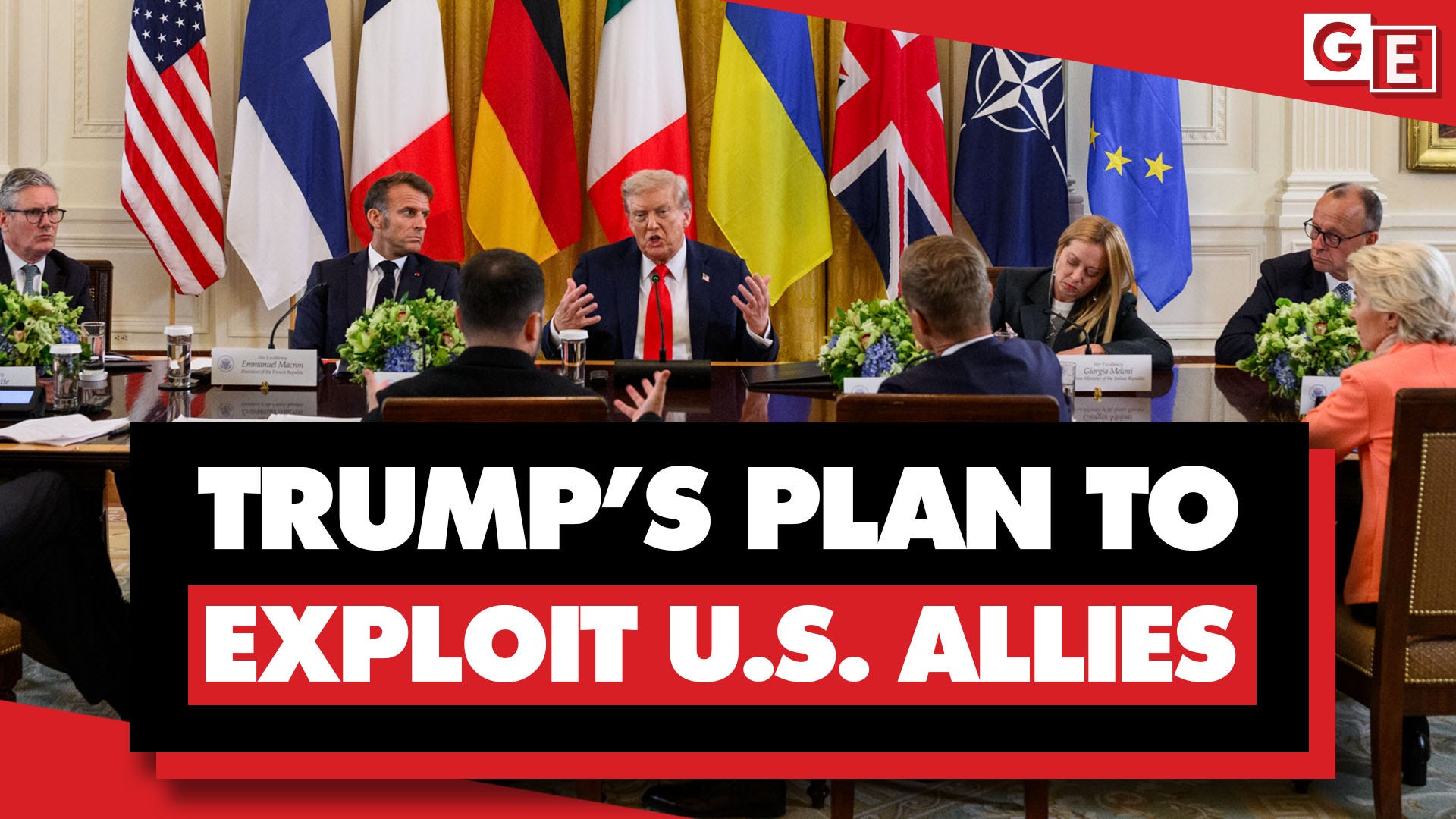
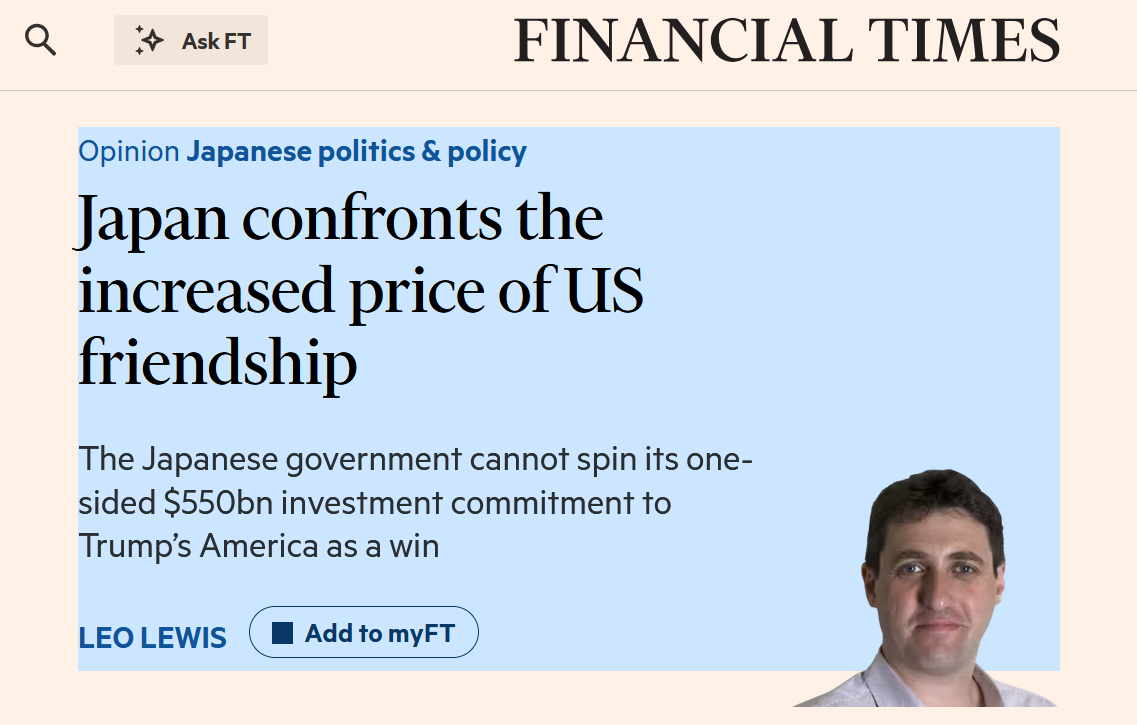
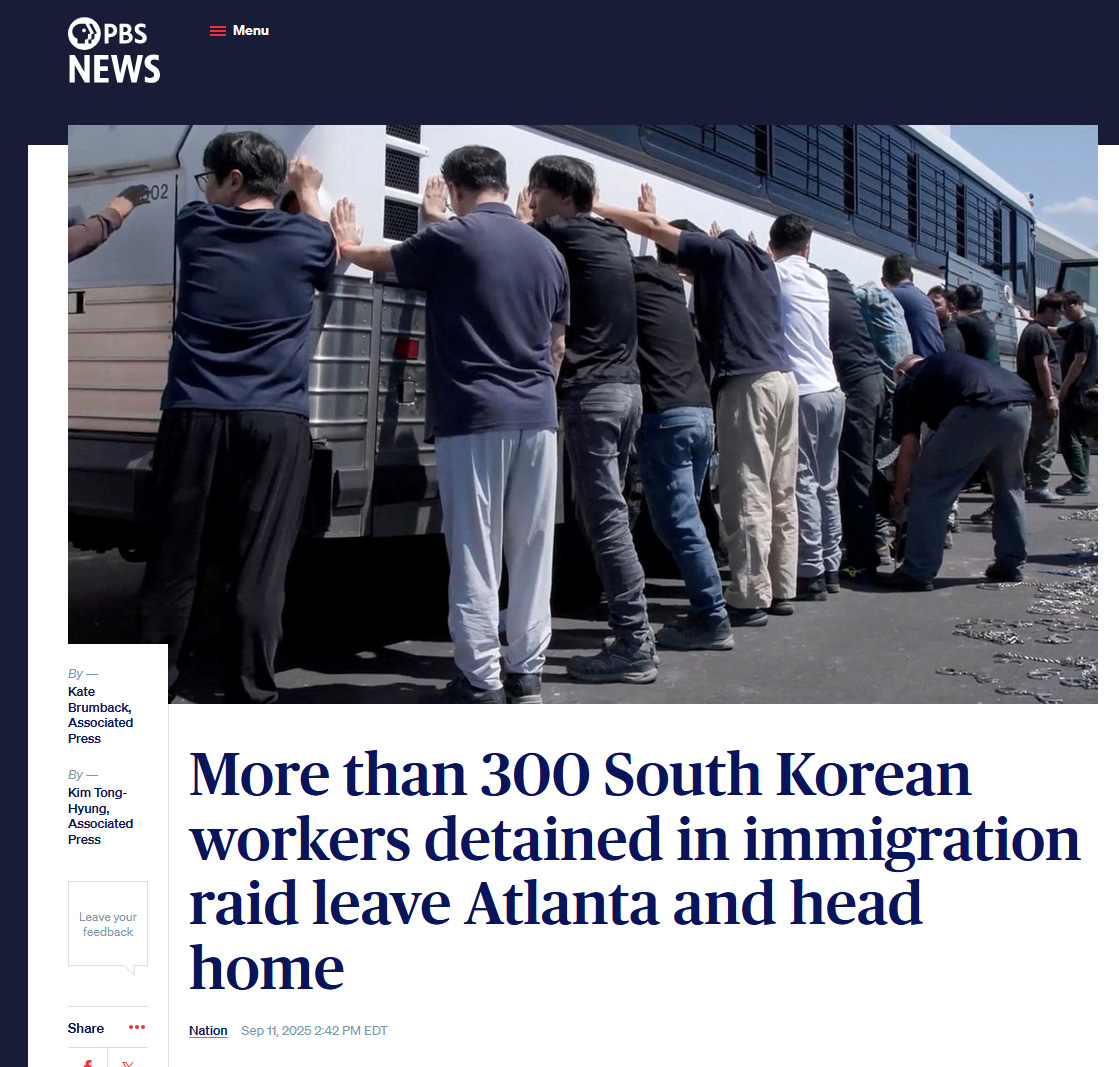
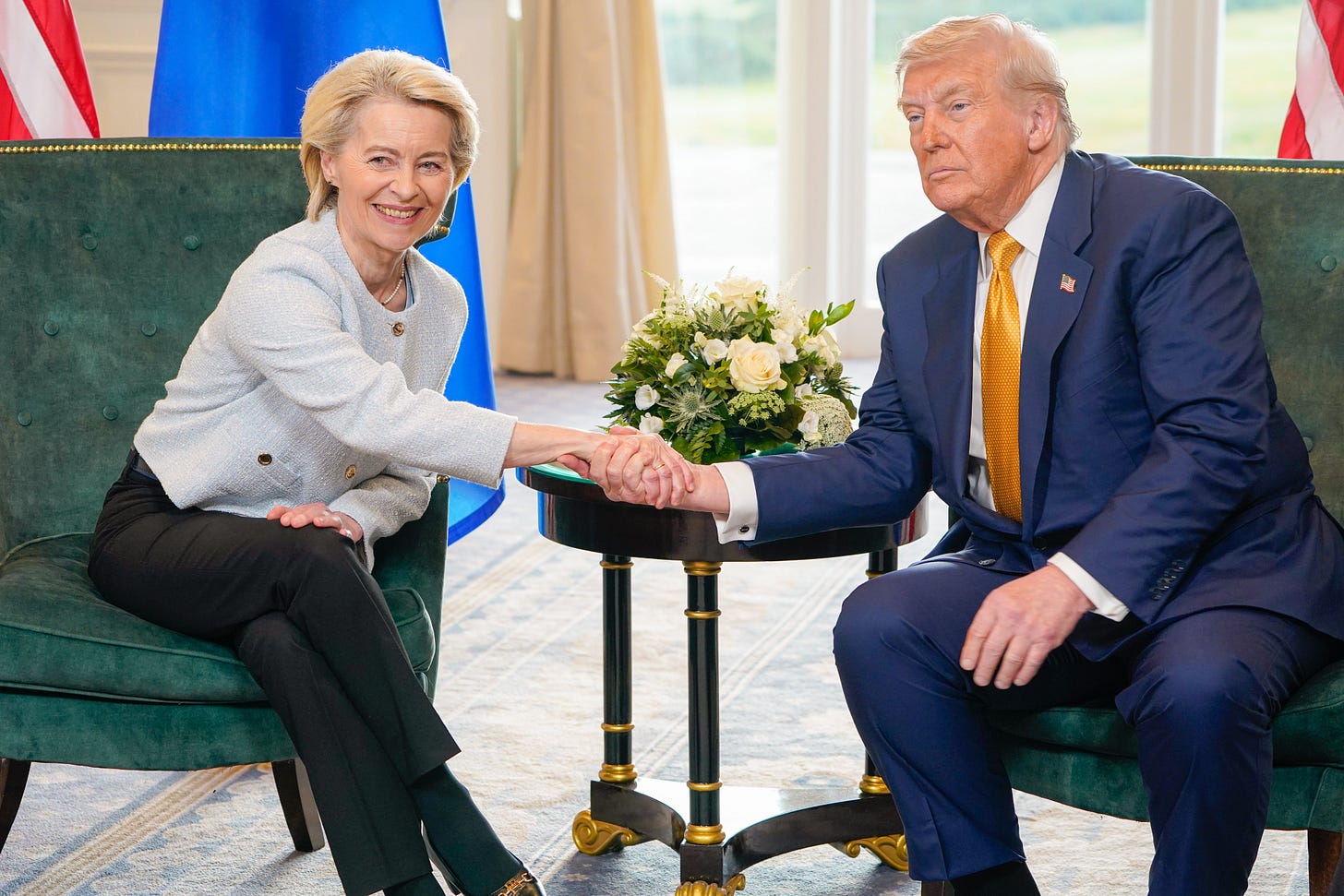
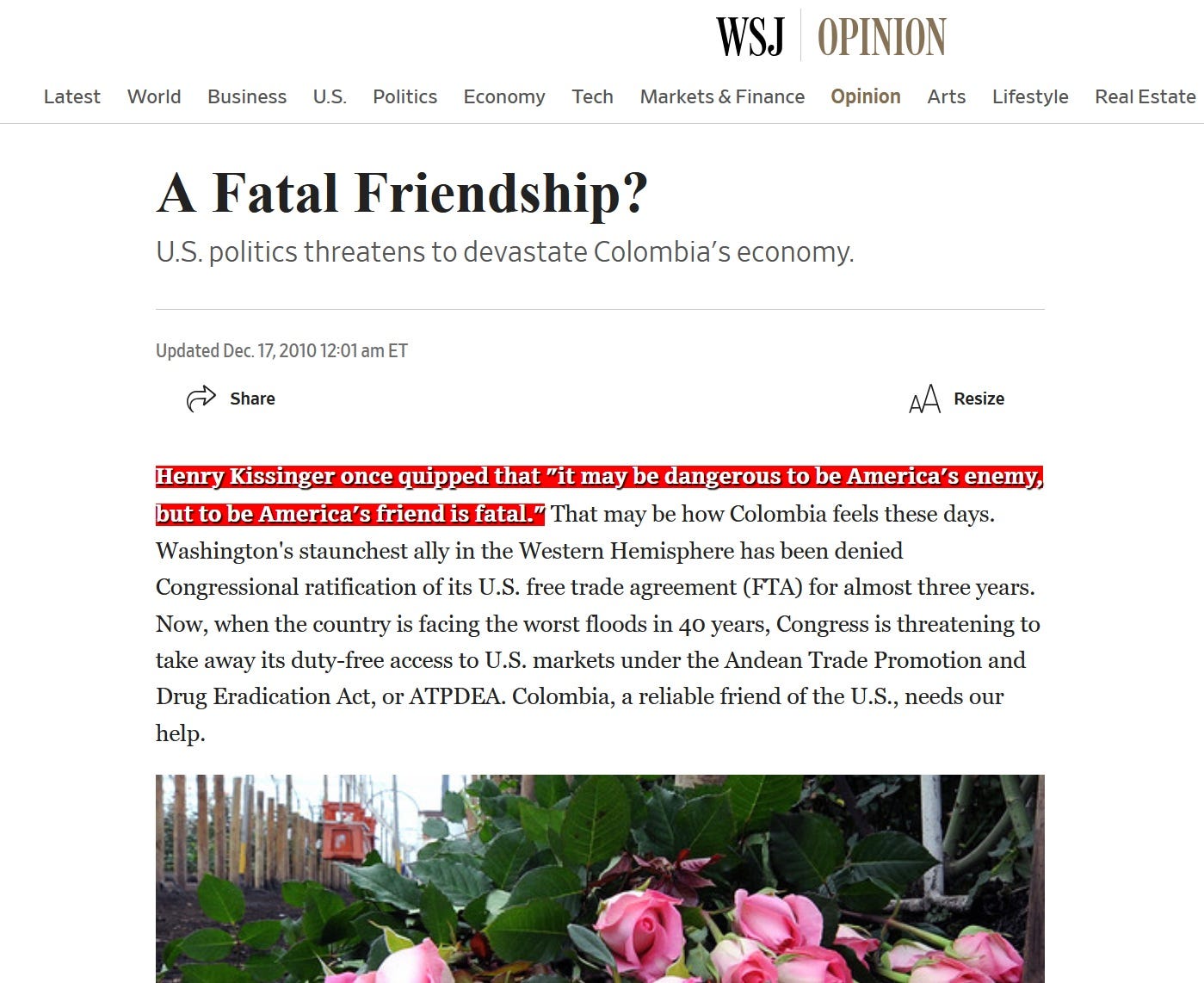
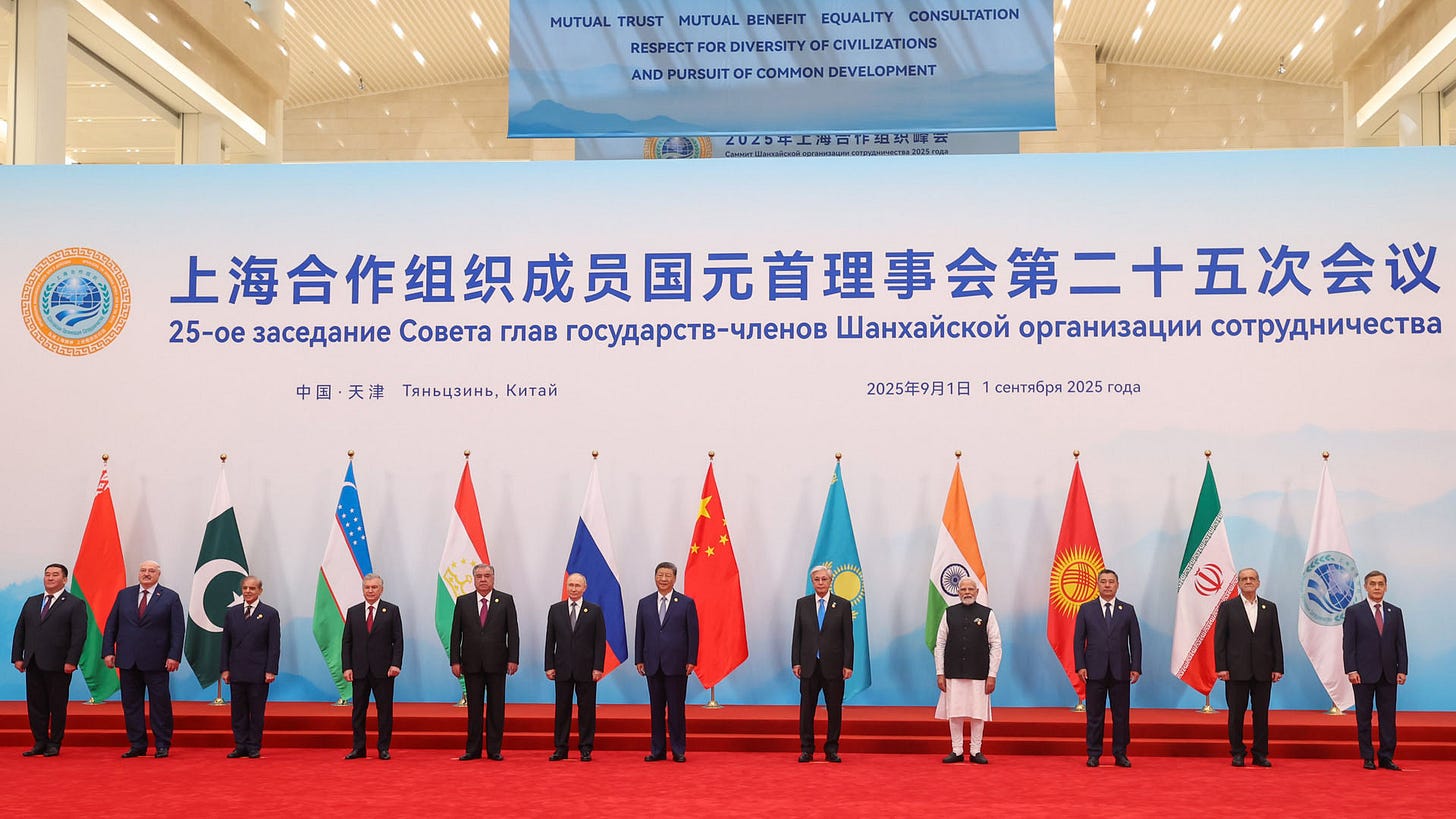
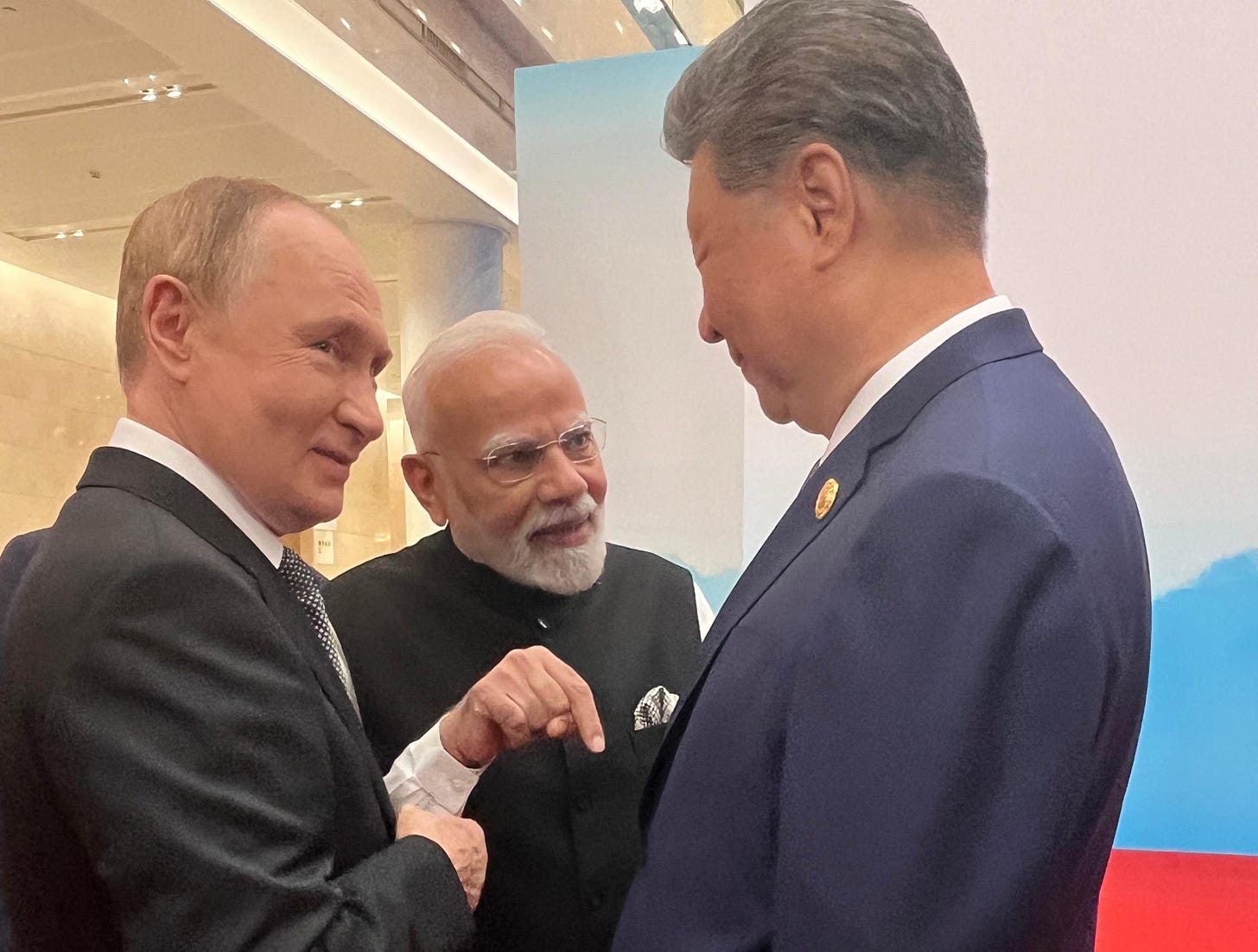
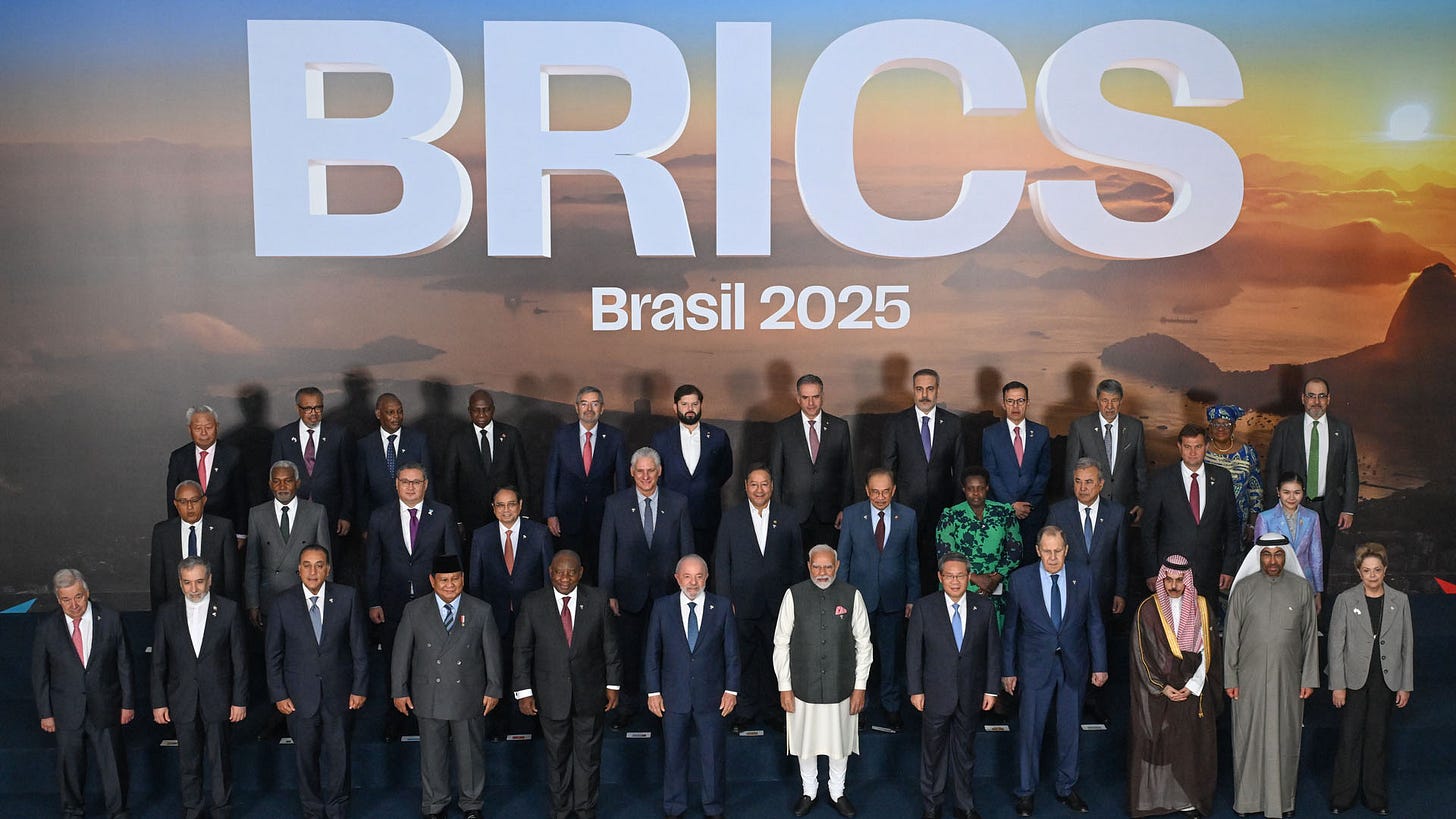
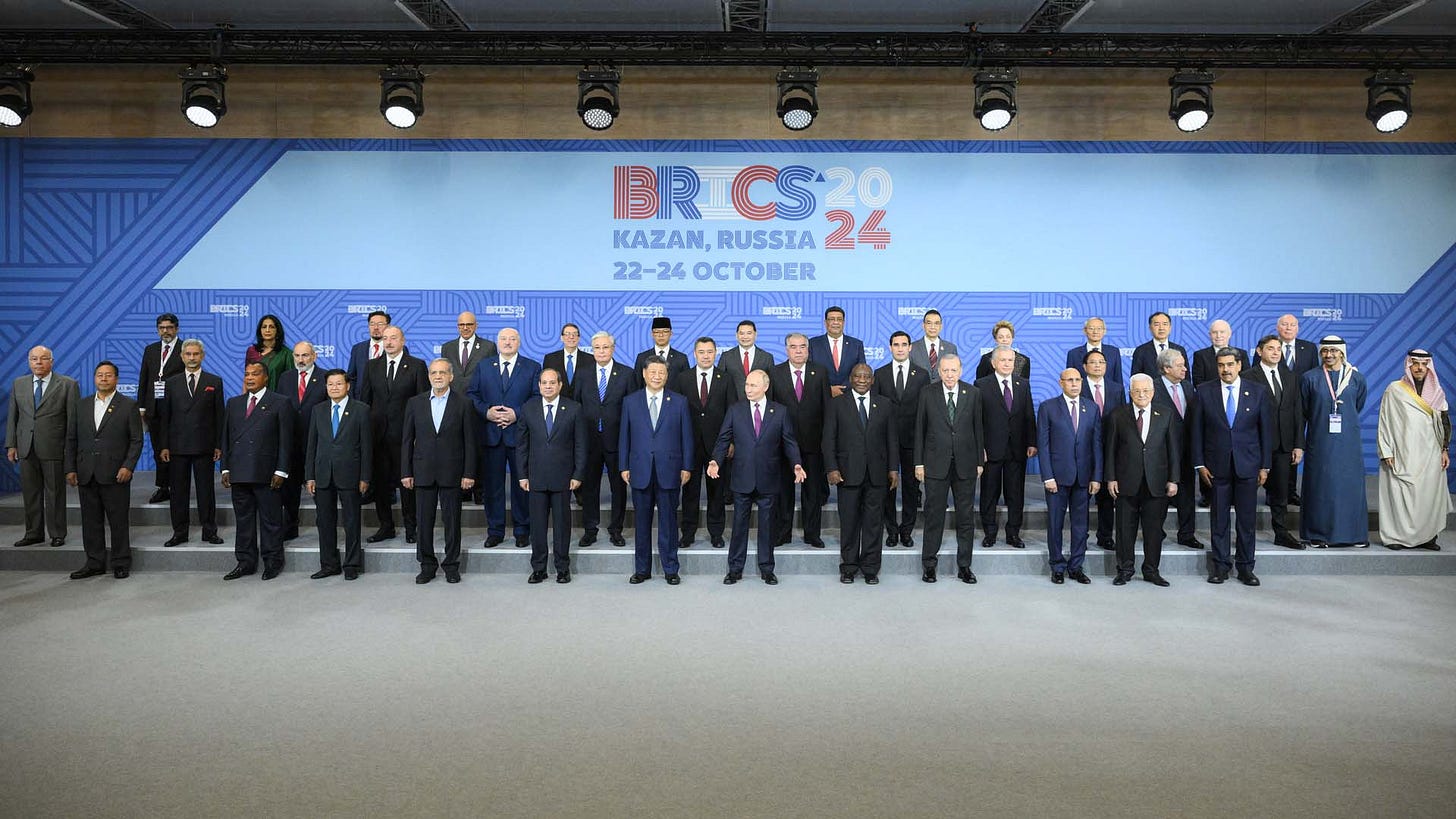
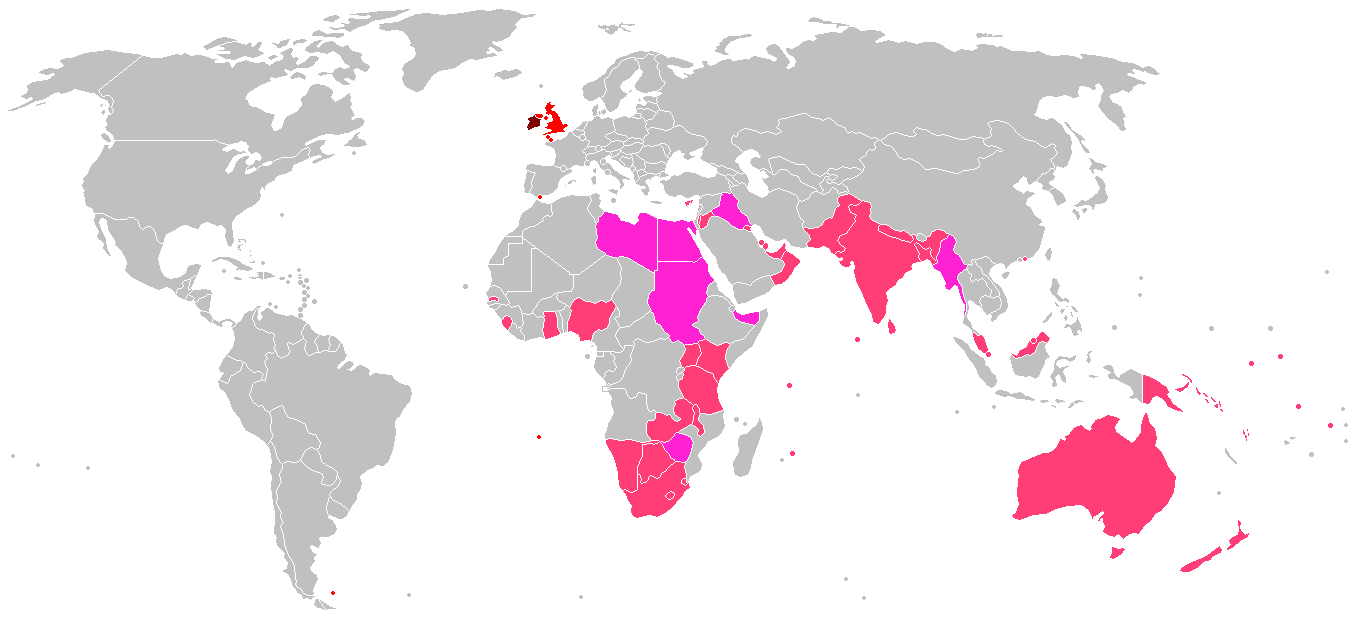
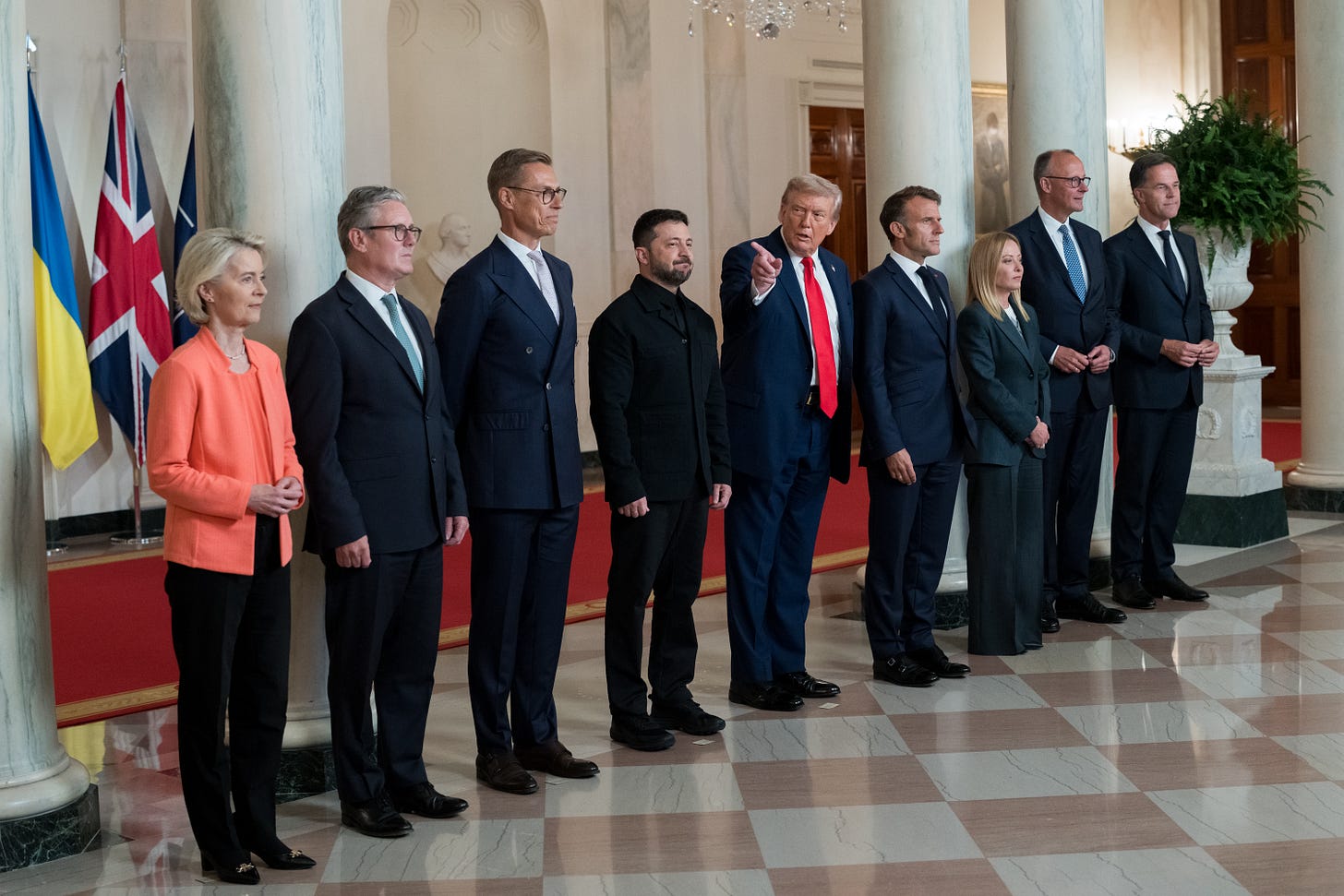
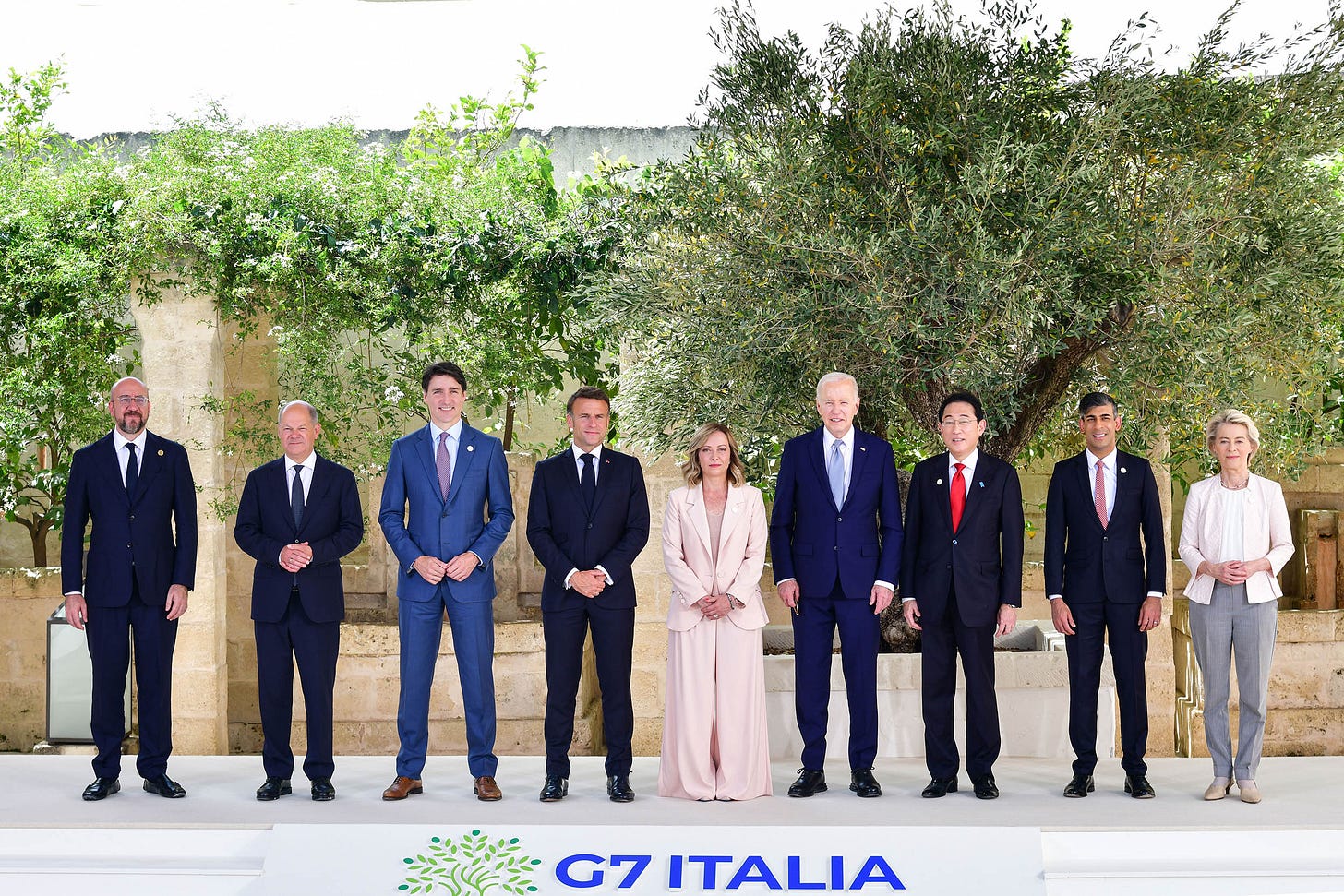
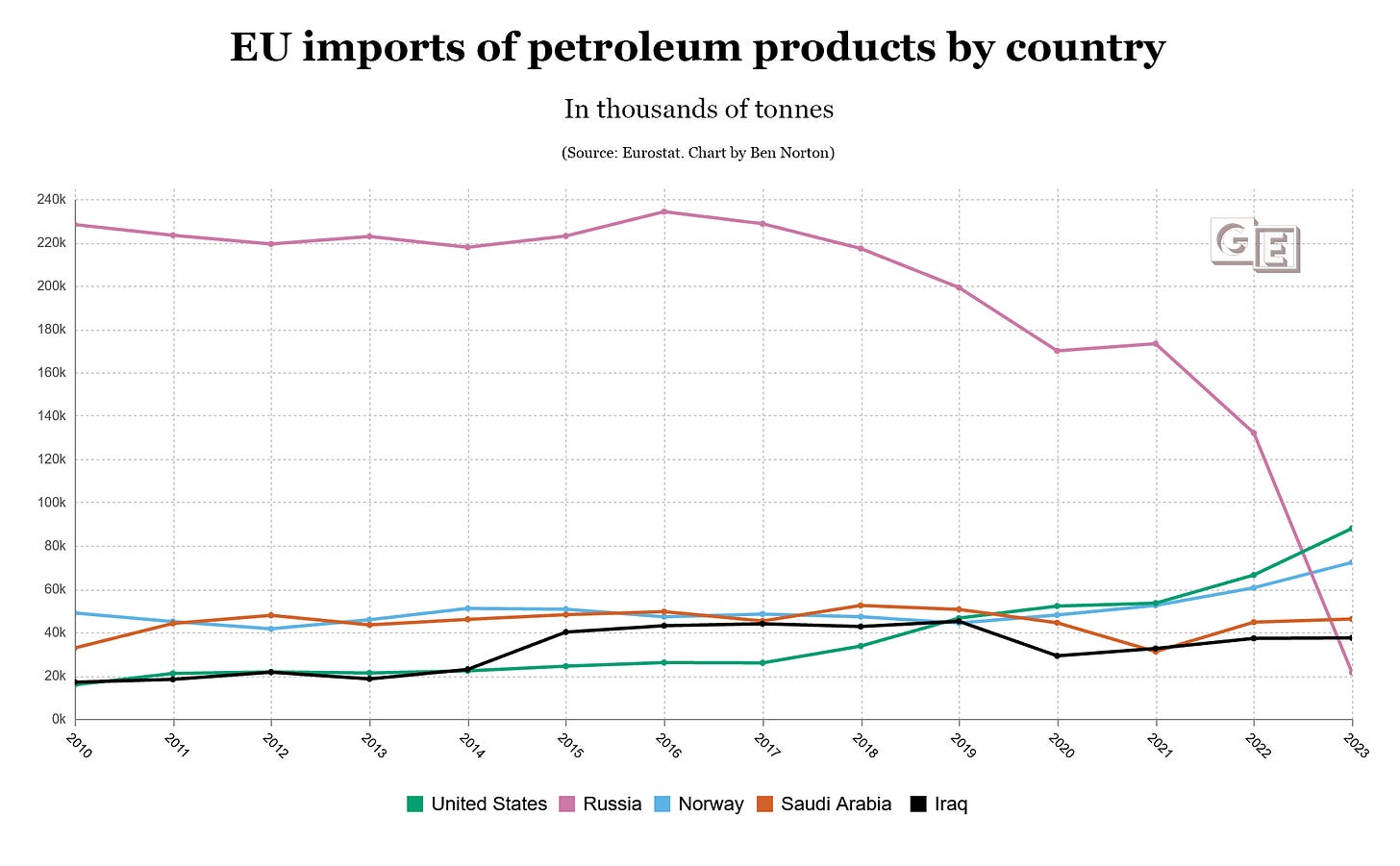
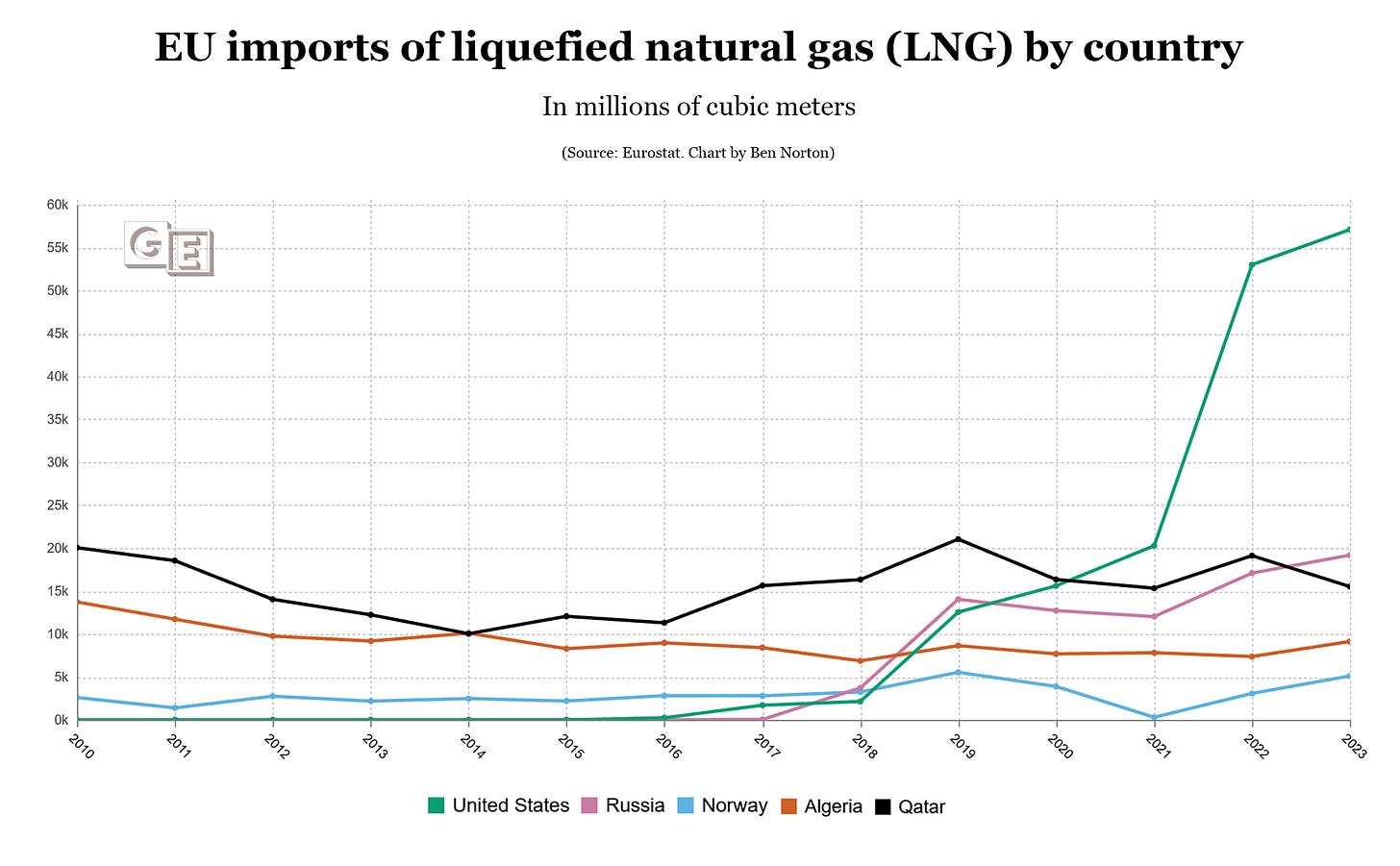
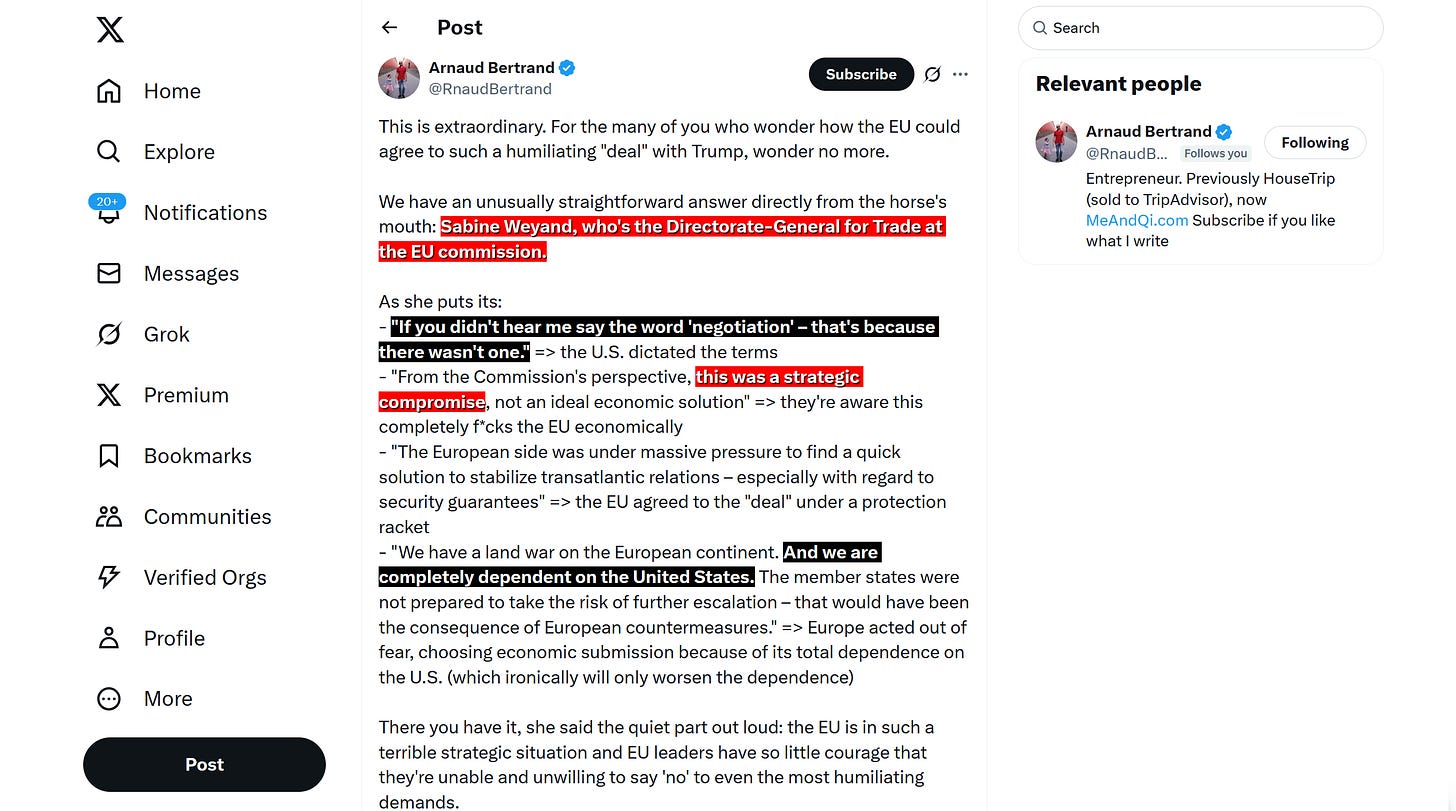
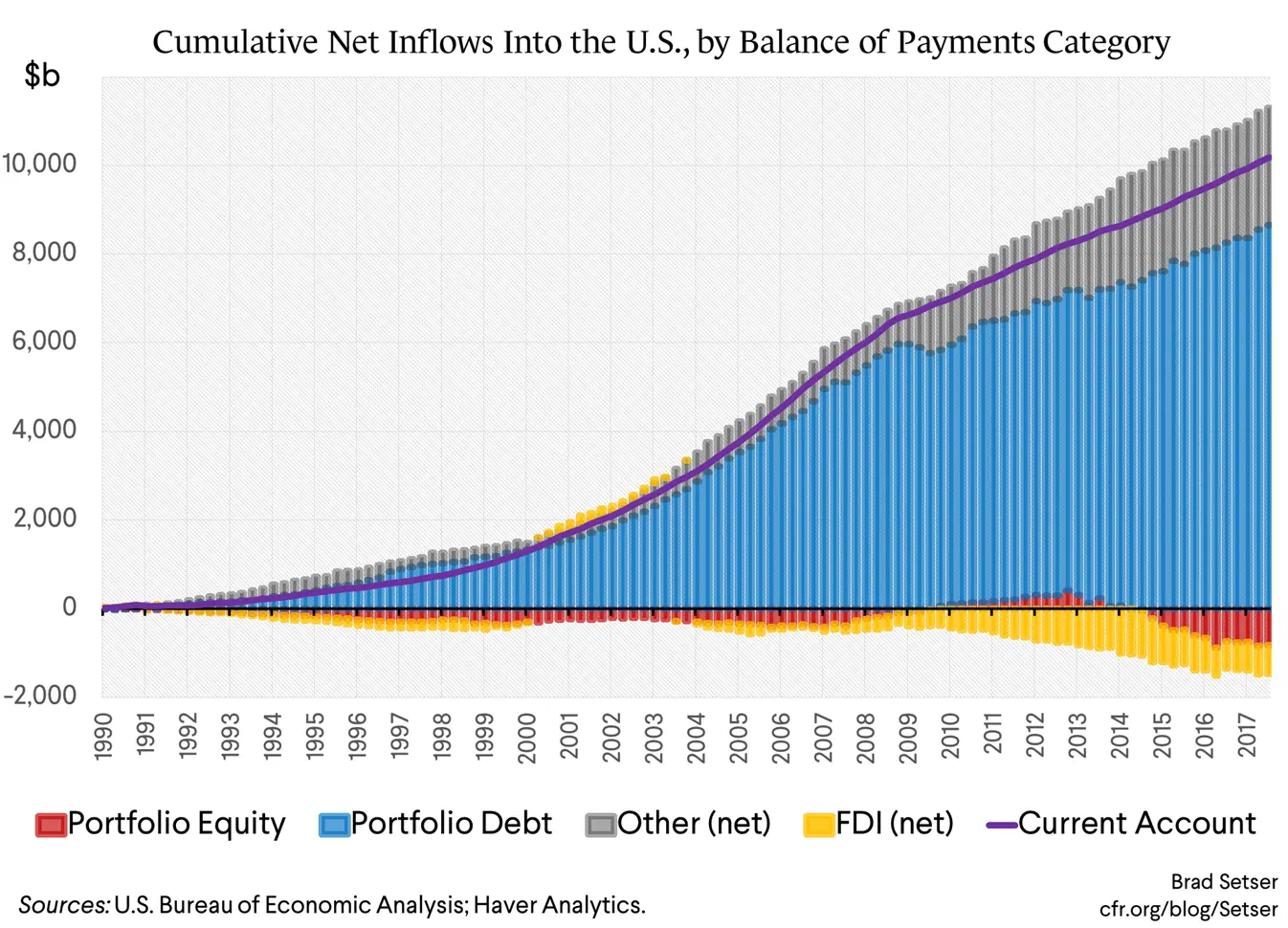
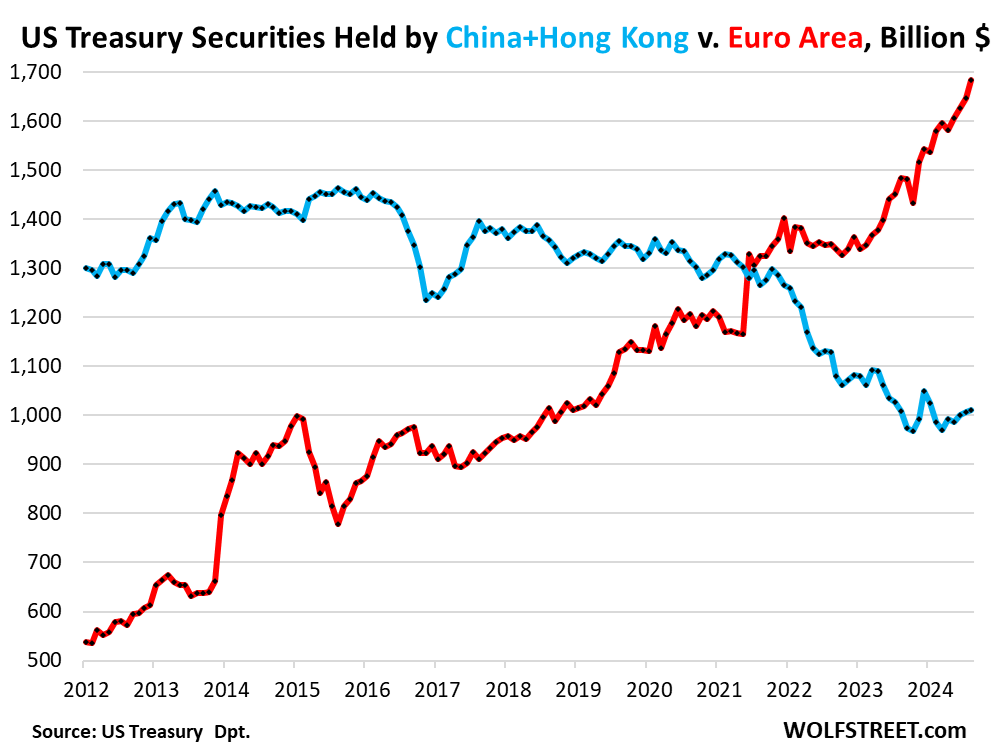
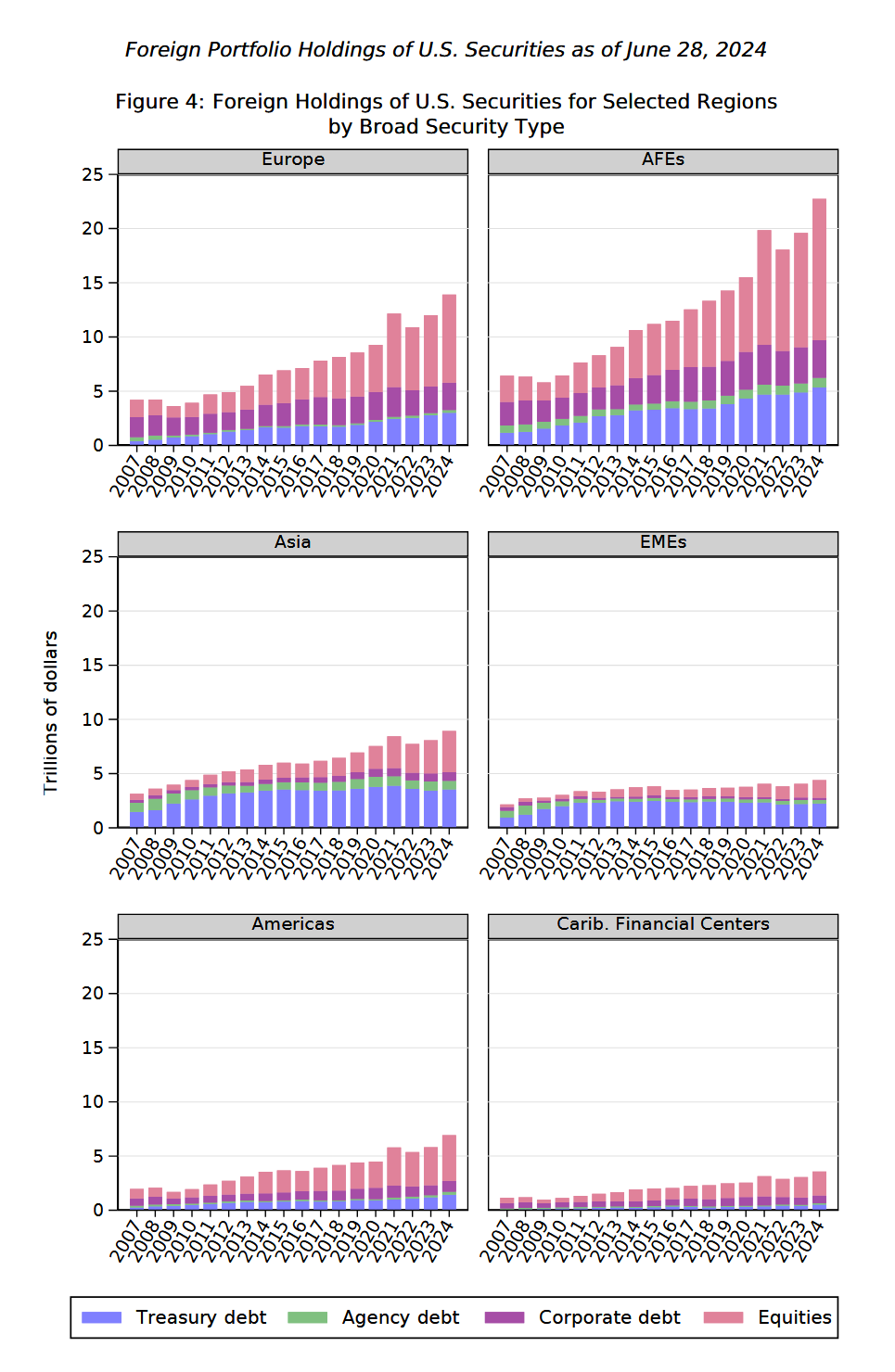
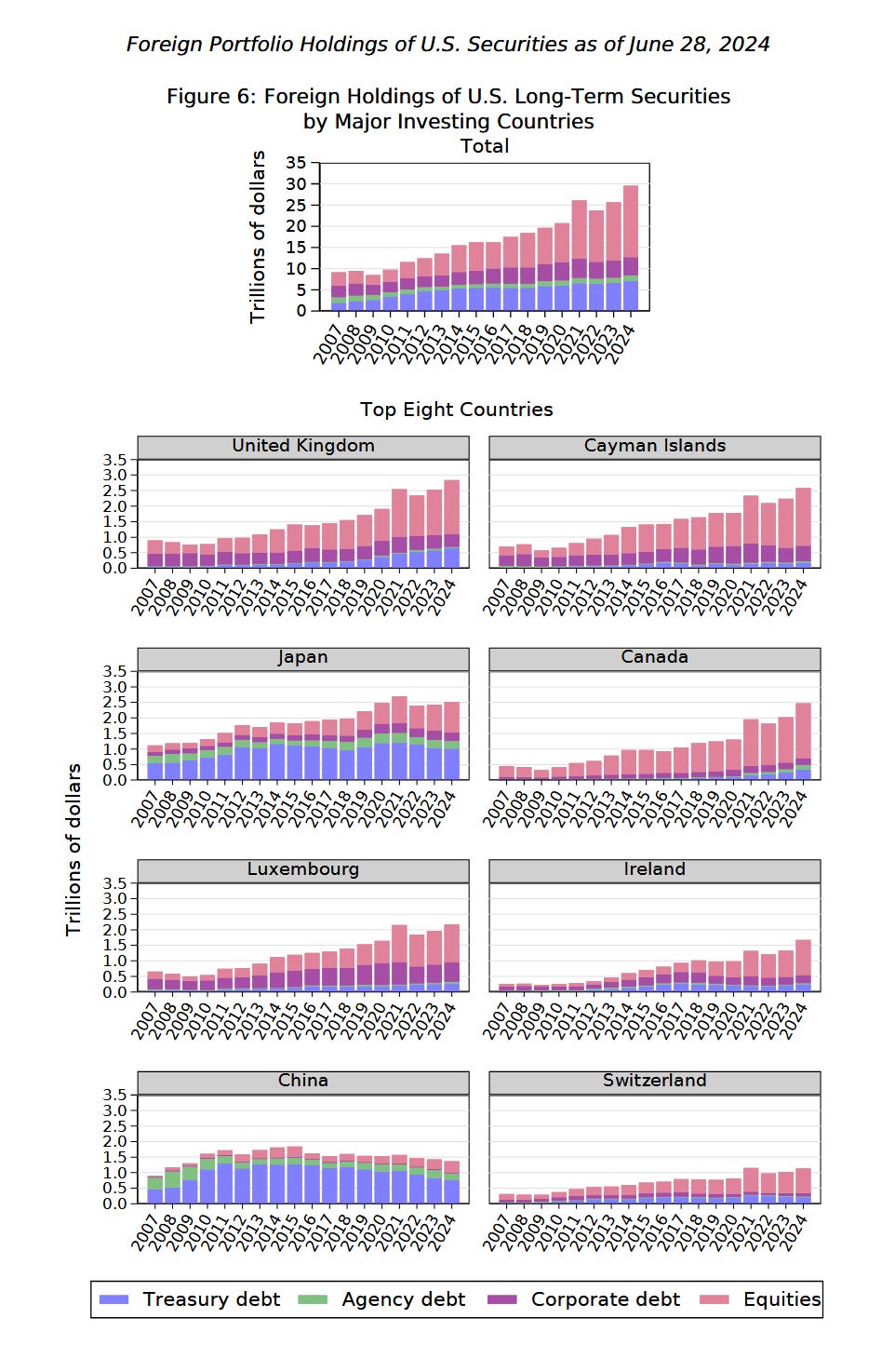
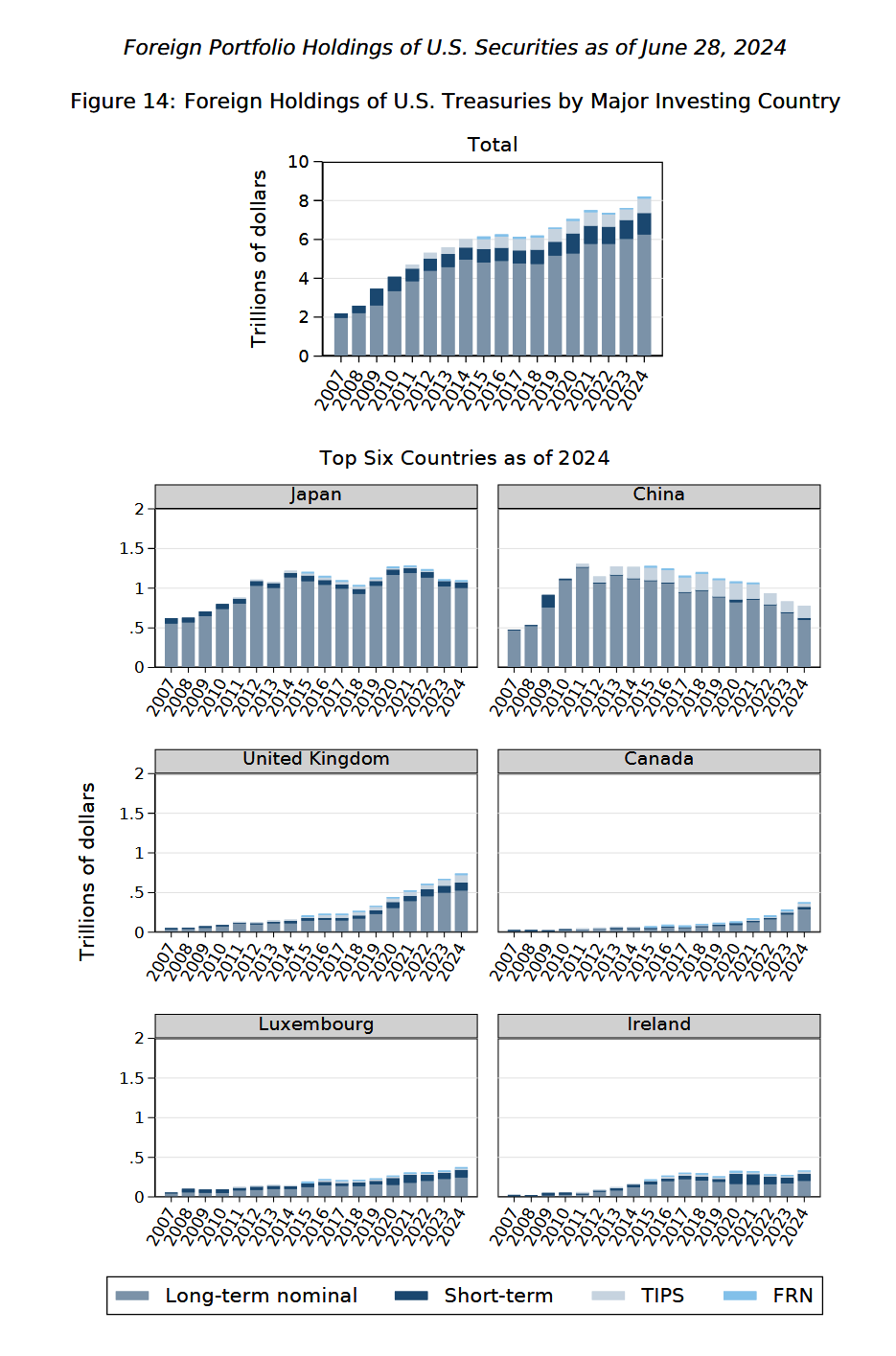
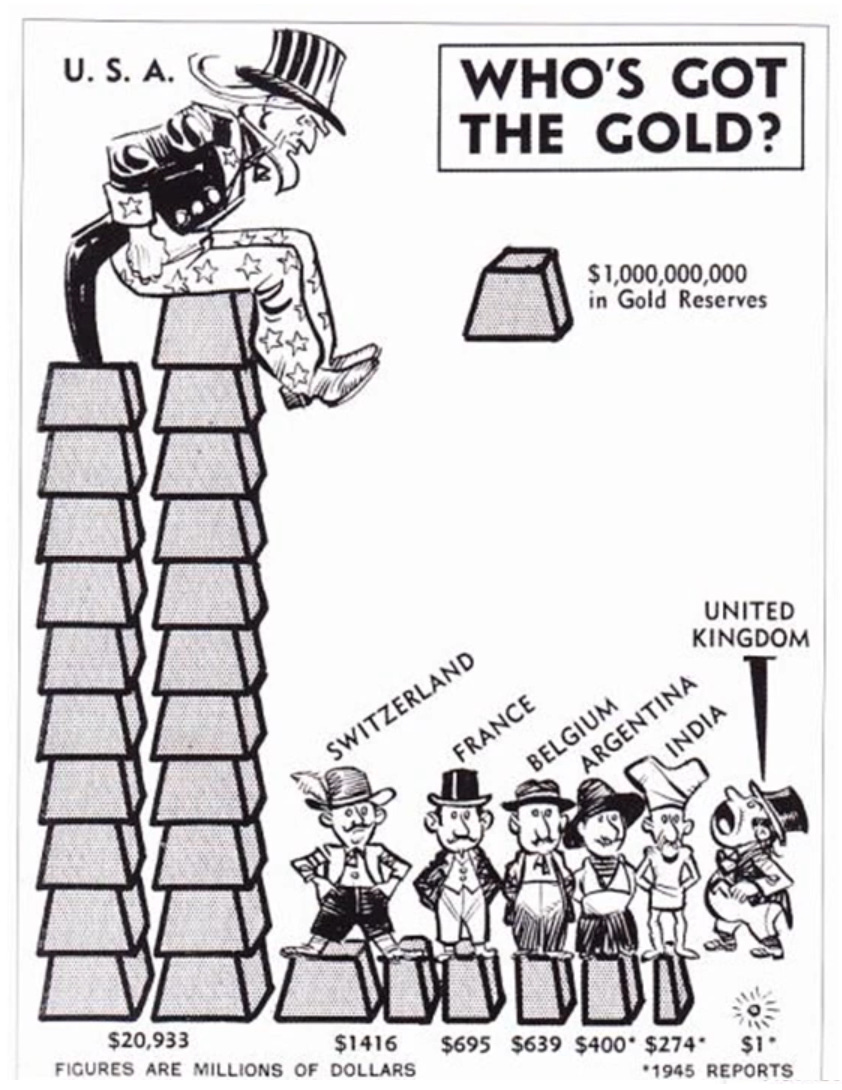
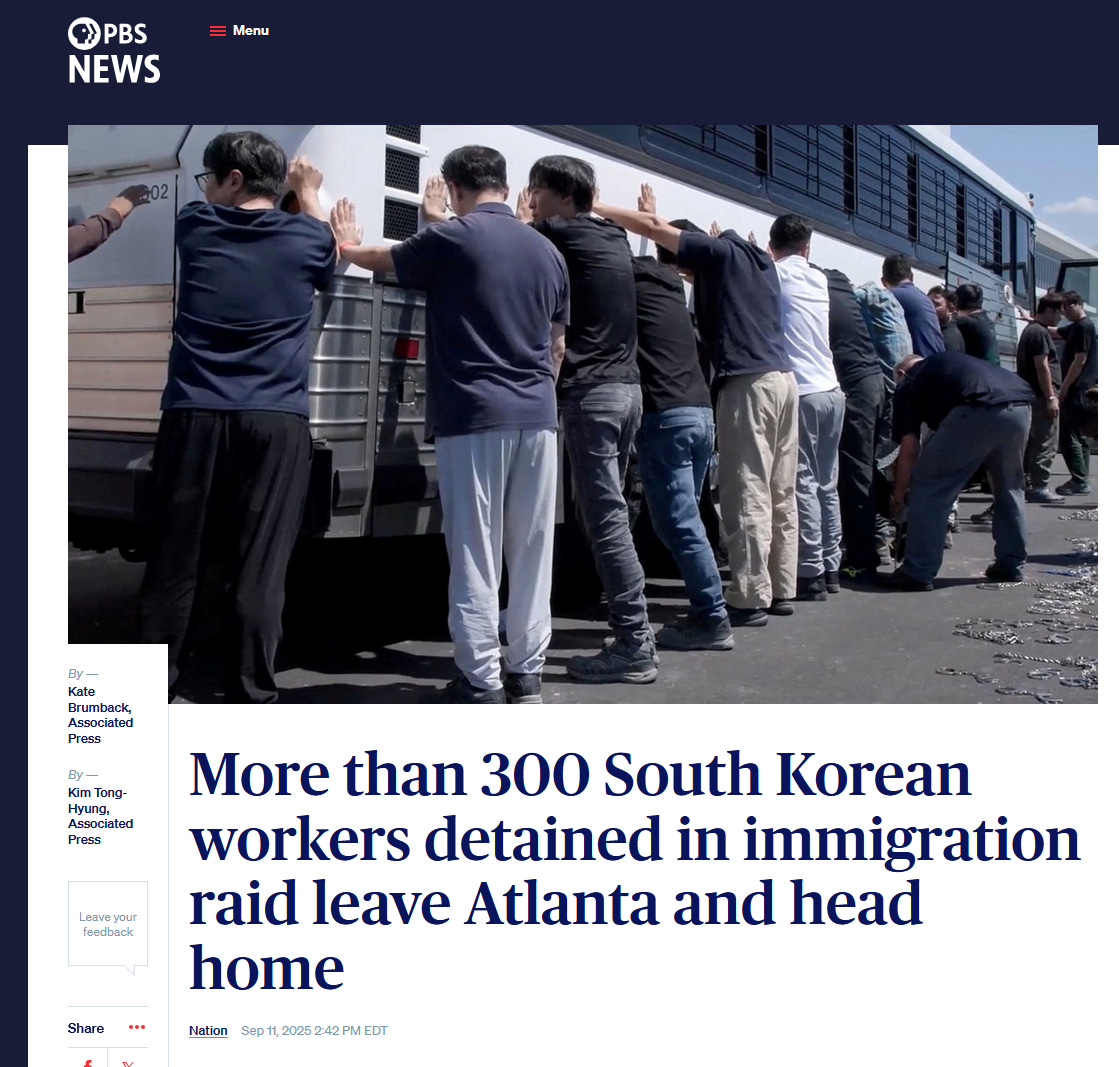
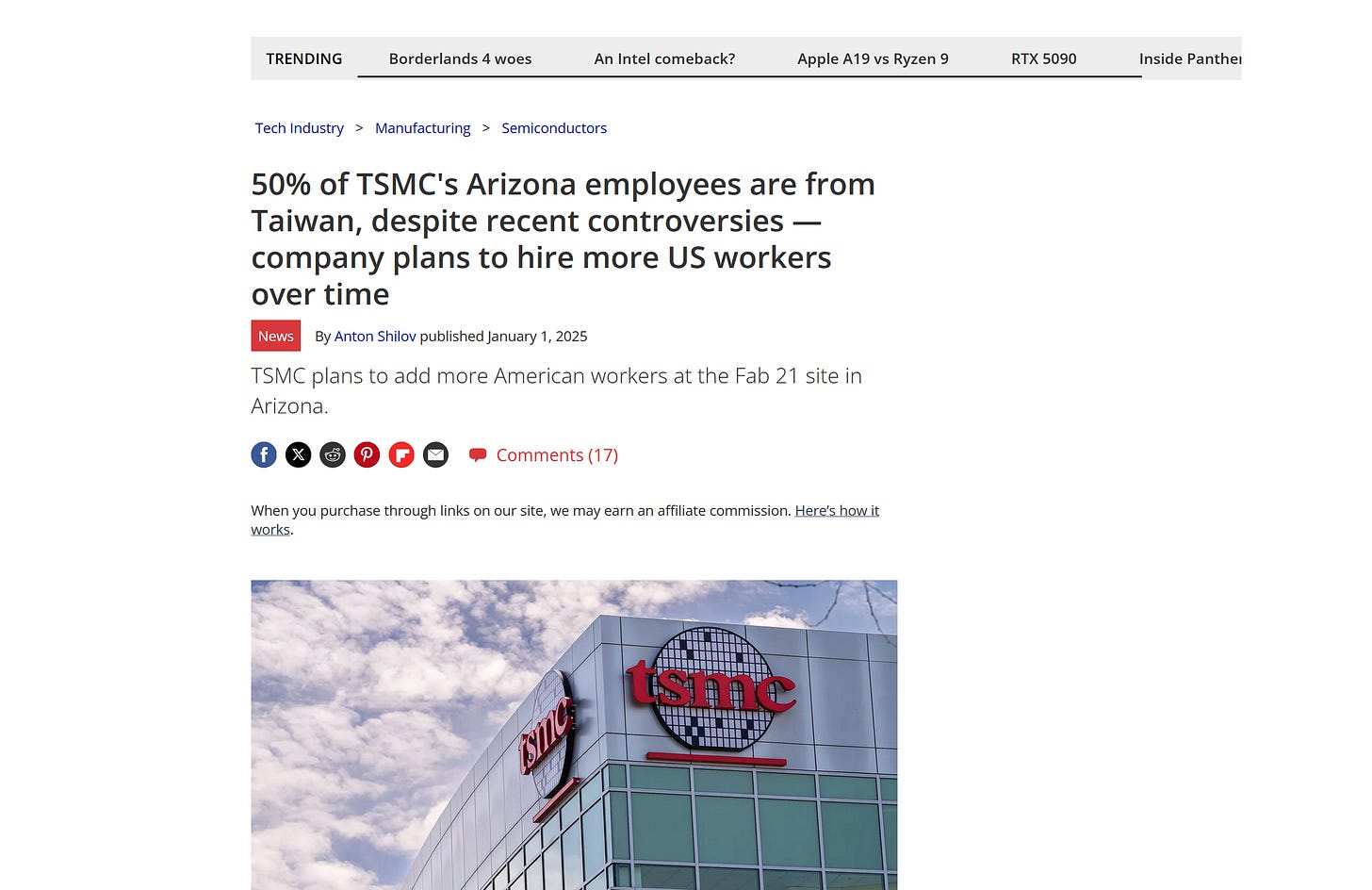

Trump is an extortionist, a desperate failure in his desperate hour and the backlash is going to have horrendous consequences for the US. Still preying on Japan 80 years later is despicable.
In its present trajectory the US is headed for the trash bin of
history and will have no one or nothing to blame but itself.
There will be few tears shed by its all too numerous offended
victims across the world when destiny comes knocking on its
barricaded door!